









By EARYEL BOWLEG Tribune Staff Reporter
ebowleg@tribunemedia.net
PREGNANT mom
Lauren Saunders tenderly strokes her baby bumpjust days before both died when the mother-of-two was reportedly shot dead at close range.
Her family’s desperate search for the missing seven-month pregnant mother ended in anguish yesterday when her
partially decomposed body was found in bushes off Munnings Road. Police have not confirmed the identity of the victim, but it is believed to be 30-year-old Lauren, who had been missing since Sunday.
A man has been in custody for two days, helping police inquiries.
Heartbreaking scenes unfolded early yesterday morning as family members screamed and sobbed


behind the police tape, with some breaking past officers to get closer. One woman collapsed and had to be treated by paramedics.
Assistant Commissioner of Police Earl Thompson said officers found the body around 8am while following leads in the missing person investigation. He said foul play is suspected, and confirmed that the woman appeared to be pregnant.
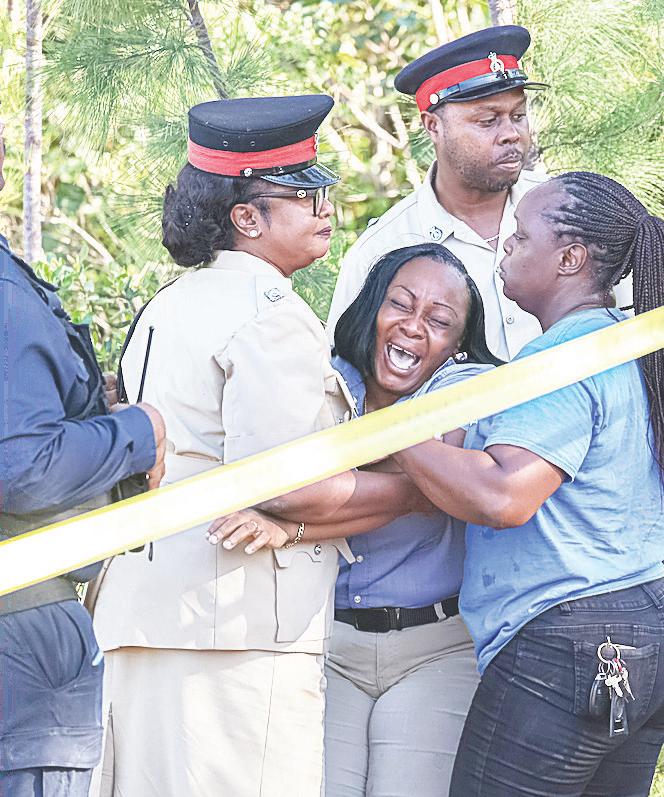
body
By LYNAIRE MUNNINGS Tribune Staff Reporter lmunnings@tribunemedia.net
A BY-ELECTION will be held on November 24 to fill the Golden Isles seat left vacant by the death of Vaughn Miller. The Progressive Liberal Party (PLP) is expected to nominate Darron Pickstock to contest the seat, while the Free National Movement (FNM) has
announced Brian Brown as its candidate for the next general election. The FNM has not officially said whether it will contest the by-election, but should it do so, Mr Brown will be its candidate. Meanwhile, the Coalition of Independents has named Brian Rolle as its standard-bearer. Wayne Munroe, Minister with responsibility for the BY-ELECTION - SEE PAGE SEVEN
By LEANDRA ROLLE Tribune Chief Reporter lrolle@tribunemedia.net
AN audit of the Minnis administration’s COVID19 food programme found no evidence of corruption or misuse, despite the widely publicised allegations Prime Minister Philip “Brave” Davis made early in his term. The $52m food programme and the National
Food Distribution Task Force (NFDTF), established to feed the most vulnerable during the pandemic, came under intense scrutiny after Mr Davis raised concerns, even sparking a police investigation. Among them were claims that crucial details on the programme’s spending were missing.
Prime Minister Philip AUDI T - SEE PAGE 11





By KEILE CAMPBELL Tribune Staff Reporter kcampbell@tribunemedia.net
RESIDENTS of Crooked Island have been without electricity and running water for nearly a week after both of Bahamas Power and Light’s (BPL) generators failed and a transformer linked to the Water and Sewerage Corporation (WSC) stopped working, forcing schools, businesses, and government offices to close.
The water outage has affected the settlements of Colonel Hill and Cabbage Hill, leaving hundreds of residents without essential services. Many have turned to small private generators, with some resorting to stored rainwater to cope.
In a statement, BPL con-
firmed that two engines supplying electricity to Crooked Island had suffered mechanical failure.
“We sincerely apologise for the extended power outage,” the company said.
“Our team has acquired a new generation unit from New Providence which has been shipped via mail boat. Once it arrives, technicians will begin work to bring it online and restore power supply.”
BPL shared photos showing the engines had arrived on the island yesterday.
The company expects electricity to be restored before the weekend and said it will continue to share updates
through its stakeholder group on the island, which includes the administrator and local representatives.
Timothy Thompson, a 70-year-old resident, said he spent an entire day repairing an old diesel generator so he could pump water into his home.
“I had a little diesel generator from years ago,” Mr Thompson said. “I worked on it all day until I got it running so I could get some water. But we really need two brand new generators for Crooked Island. Every time, they send us old ones from somewhere else, fix them up and ship them down here. That is not fair.”
He said that while he can manage, many of his neighbours cannot.
“There are plenty old people on this island,” he said. “They cannot handle this heat, and they need water. Both schools are closed because there is no water. In 2025, my God, we should be better than that.”
Mr Thompson believes solar energy would be the best long-term solution.
“We got plenty sunshine,” he said. “Long Cay has solar power and only about five or six people live there. Why can’t Crooked Island be solarised? That is the answer right there.”
Deputy Chief Councillor of Local Government, Elvie Cunningham, confirmed that residents have been without water for at least five days
and that both BPL generators are down.
“My freezer is leaking water on the floor,” she said. “We are losing what little we have stored. The team here on the ground is doing the best they can, but they are suffering too. The whole island is out.”
Despite the circumstances, Ms Cunningham said residents were trying to remain calm.
“Getting irritated will not solve the problem,” she said. “All we can do now is speak up and hope that something happens soon. When the powers that be see that the island is speaking out, maybe they will move a little faster.”
Other residents expressed frustration and fatigue, saying years of neglect had left the island unprepared for such a total breakdown.
Sonia McKinney, who works in the tourism sector, said the crisis has brought life on the island to a standstill.
“For weeks we were having power outages off and on,” Ms McKinney said. “BPL should have known that the generator was bad, but now everything is gone at once. The water plant was destroyed because of the power surges, and the internet went out after the last hurricane. We have nothing now, no power, no water, no internet, nothing. The whole island feels shut down.”
Ms McKinney said her
By LYNAIRE MUNNINGS Tribune Staff Reporter lmunnings@tribunemedia.net
THE government has transferred $17m into the Disaster Emergency Fund, almost coinciding with today’s long-delayed opening of the Abaco Multipurpose Hurricane Shelter.
The timing has stirred political debate, with the opposition questioning whether the move is an election-year gesture.
Prime Minister Philip “Brave” Davis said the fund marks a key step in improving national disaster response and will ensure the government can act “swiftly, effectively, and equitably” when storms strike.
“We contribute so little to the problems of the world, and yet we suffer the direst consequences,” Mr Davis said in the House of Assembly.
“Conservative estimates suggest that over 40 percent of our national debt exists because of climate change, not because of
mismanagement or poor planning, but because we live in the path of storms we did not create.”
The $17m transfer forms part of the Comprehensive Financial Strategy for Disaster Risk Management under the 2022 Disaster Risk Management Act, created with Inter-American Development Bank support. It is meant to fund all stages of disaster preparation and recovery.
Mr Davis said the fund will help strengthen preparedness, response, and rebuilding efforts, ensuring The Bahamas never repeats the slow response seen after Dorian. The Abaco shelter, designed to withstand Category Five hurricanes and serve as a community centre, has faced repeated setbacks since construction began. Structural issues, vandalism, and security lapses pushed its completion beyond several missed deadlines, including July 2025.
Opposition Leader Michael Pintard said while he supports the fund, he
questioned the lack of transparency and regulation governing its use. He urged the government to table clear spending rules before releasing money.
“Before we do that, Madam Speaker, this House must insist on rules, transparency, and a plan that strengthens both response and prevention,” Mr Pintard said. He also warned that the fund could be depleted by a single major storm and questioned how it would be replenished.
Former Prime Minister Dr Hubert Minnis echoed the concerns, criticising the pace of rebuilding in Abaco and Grand Bahama and the government’s failure to complete key infrastructure projects.
Dr Minnis said climate change has made powerful hurricanes more frequent and urged that the fund be reserved strictly for disaster-related activities. He questioned why the government waited until now to activate it, suggesting the timing raises concerns about fiscal discipline.

guests were forced to leave after the resort refused to turn on its generator.
“The tourists got frustrated,” she said. “They are not used to being without air conditioning. The resort told them they were not turning on the generator for two people. That makes no sense. How are we supposed to promote tourism like that?”
She also questioned why small islands continue to rely solely on diesel power.
“It should not take a rocket scientist to figure this out,” she said. “We have all the sun in the world right here. Why are we not using solar power? Every time one generator breaks, the whole island goes down. That is no way to live.”
Ms McKinney said repeated power surges have destroyed appliances and that residents have not been compensated.
“I put in a new refrigerator five years ago,” she said. “It is already destroyed. I filed reports and nothing came of it. People lose their things over and over again and nobody replaces them.”

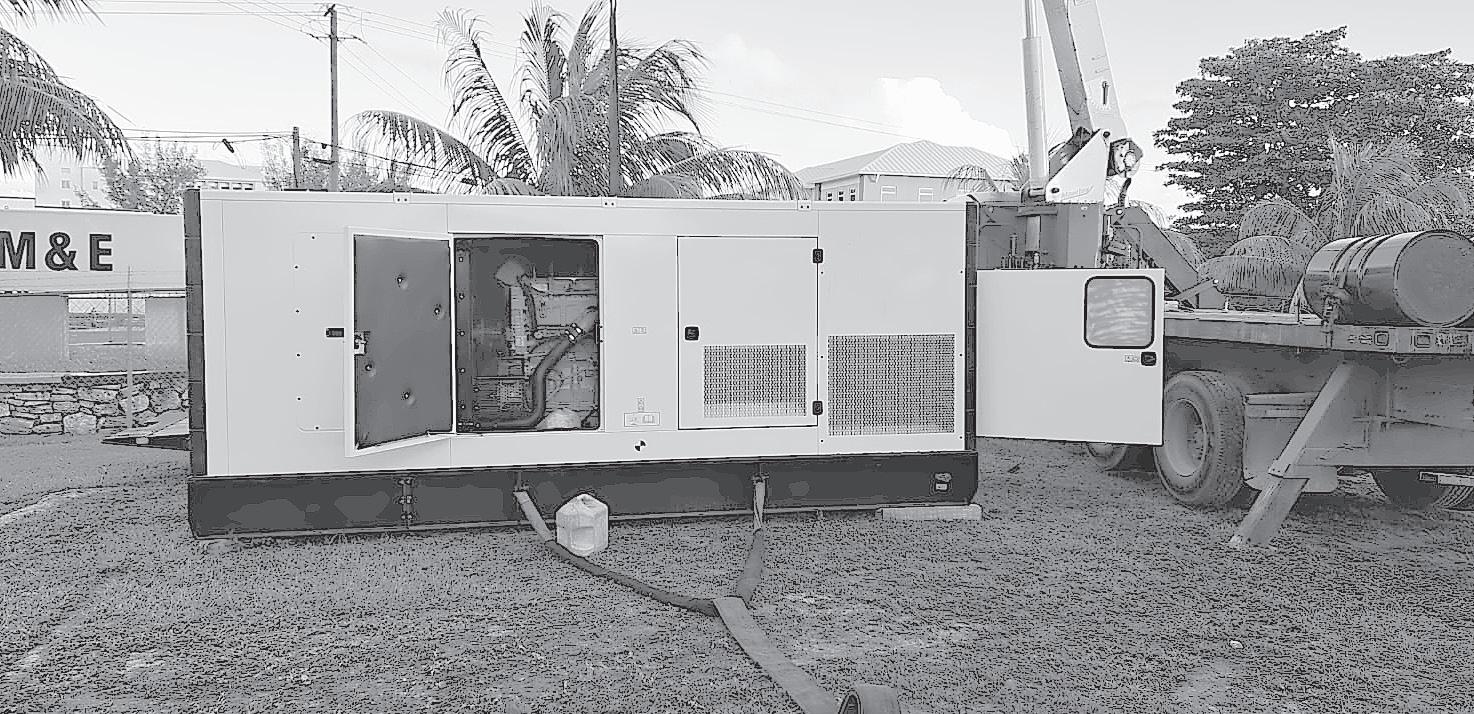

No weapon was found, though physical evidence was collected from the scene.
ACP Thompson said relatives were kept informed throughout the search despite their frustration with the pace of the investigation.
Emotions spilled over when Ms Saunders’ sister, Charmaine Edgecombe, broke through the police barrier as the remains were taken from the scene.
“Y’all say something to us then. Nobody ain’t say nothing to us,” she cried as relatives restrained her.
Family members said they filed a missing person’s report Sunday night after Ms Saunders failed to show up for a function at Atlantis. Her Jeep was later found off Coral Harbour Road with a flat tyre; her purse and shoes were still inside.
Relatives and officers searched dense bushes near Coral Harbour and Gladstone Road on Tuesday, pressing on into the night in hopes of finding her alive.
Two relatives, Patricia Waterman and Shandeka Evans, said they had searched near Munnings Drive hours before the grim discovery but were stopped from going farther.
Reverend Ordette Wells-Simms, of Holy
Trinity A.M.E. Zion Church where Ms Saunders worshipped, urged the family to hold on to faith as she comforted them at the scene.
“We crying with hope,” she said. “We’re going to wait on the law and we’re going to stand on what God wants us to stand on: faith. We’re gonna have the faith that justice will prevail.”
Latanya Jean Jacques recalled Ms Saunders’ devotion to her faith and her two young children.
One of Lauren’s closest friends, who asked for her name to be withheld, yesterday described her as a ‘loving, caring and fun girl,’ who was an excellent mother to her two young children.
“She was fun and liked to party but since she got pregnant, she not been out much,” said the friend.
“She was excited about the new baby. This is all so sad.”
Lauren is beloved to have lived in a home in a shared family property with her two children in Chippingham, Fort Charlotte.
“We don’t know exactly what happened but we started getting messages on our WhatsApp group around 11am Sunday saying Lauren was missing,” added the friend.
“We heard she went off to meet someone but then no one heard anything. She just disappeared. And then we all started looking



yesterday.
for her.”
National Security Minister Wayne Munroe said police acted swiftly after Ms Saunders was reported missing on Sunday.
Although he claimed a missing person’s flyer was issued that day, The Tribune found that none were posted in a WhatsApp group police share with media, nor was any posted on the RBPF’s Facebook page or website. Officials did not respond to this newspaper’s questions about where the missing person flyer was issued.
By Tuesday, Mr Munroe said, 69 officers, supported by drones and K-9 units, searched bushes, ponds, and coastal areas, wading through waist-deep water as they followed leads that ultimately led to the discovery.
Prime Minister Philip “Brave” Davis said he and his wife were saddened by the death. “We call for justice for Lauren. Whoever is responsible must be held accountable. Violence against women has no place in our society and must be met with the full weight of the law,” he said in a statement. Free National Movement leader Michael Pintard also extended condolences to the family.
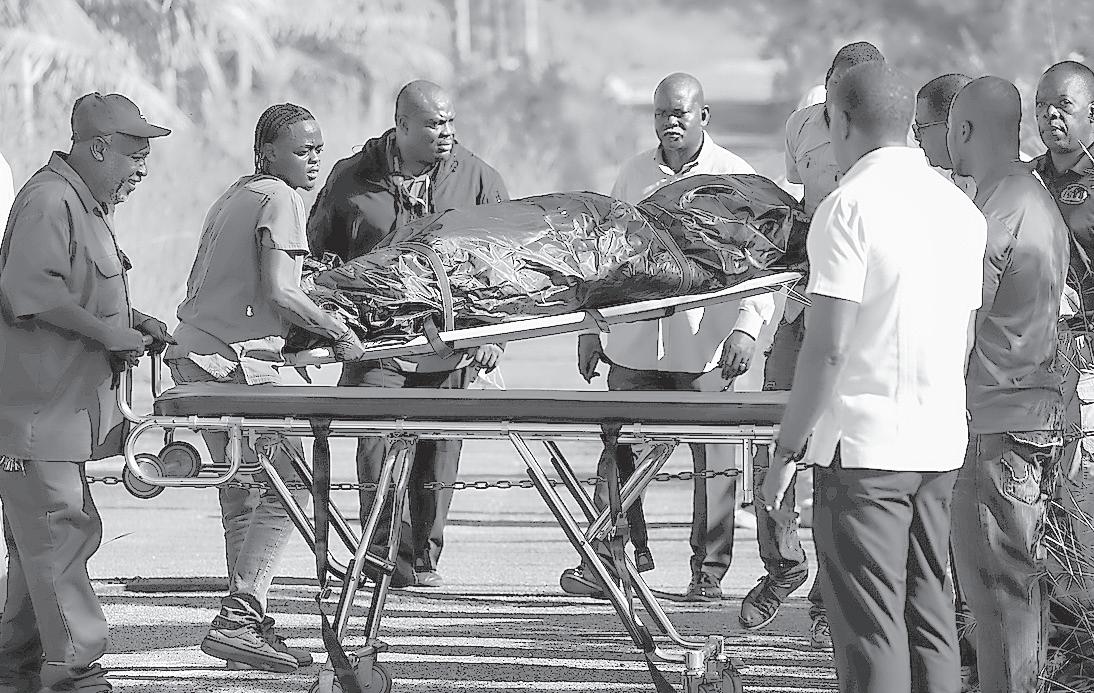

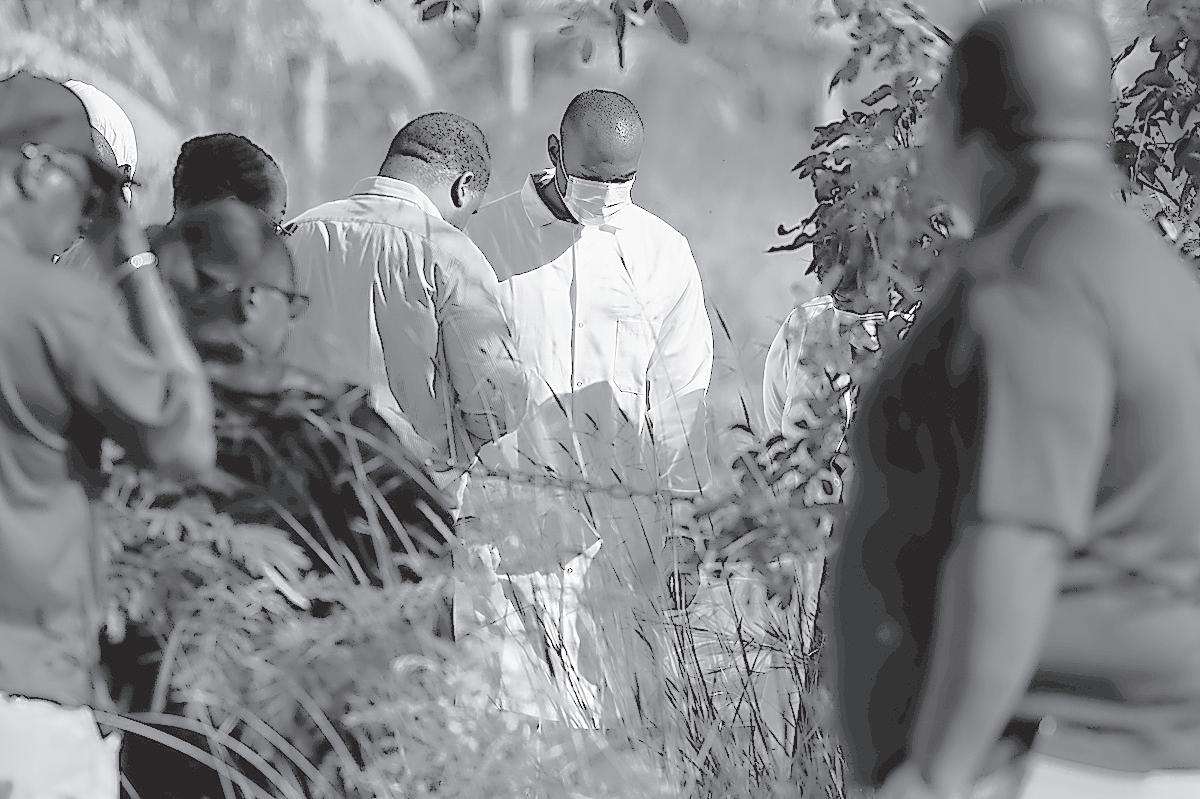

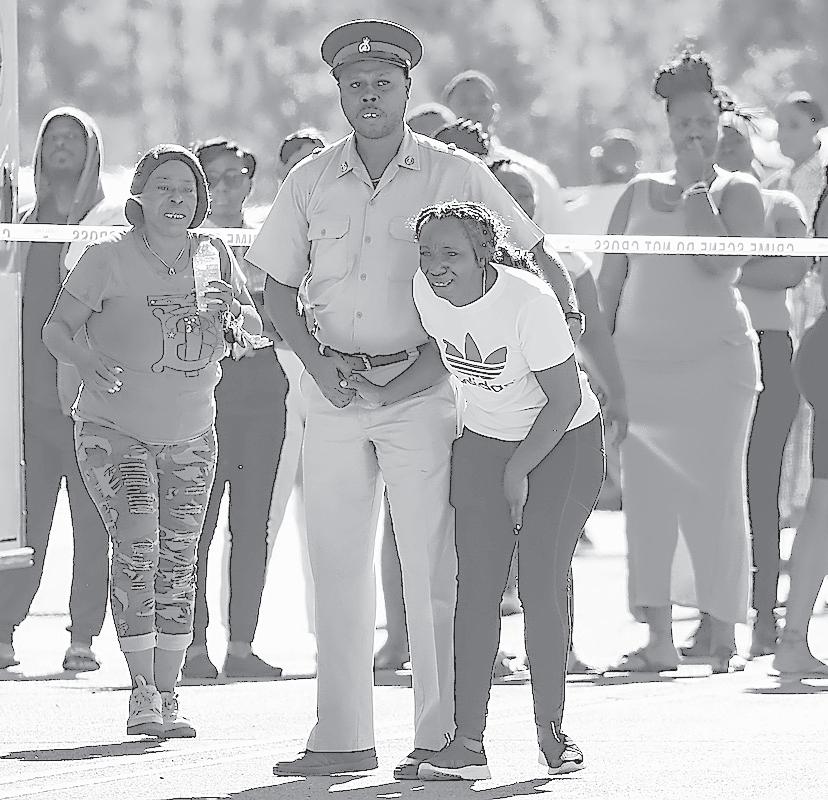

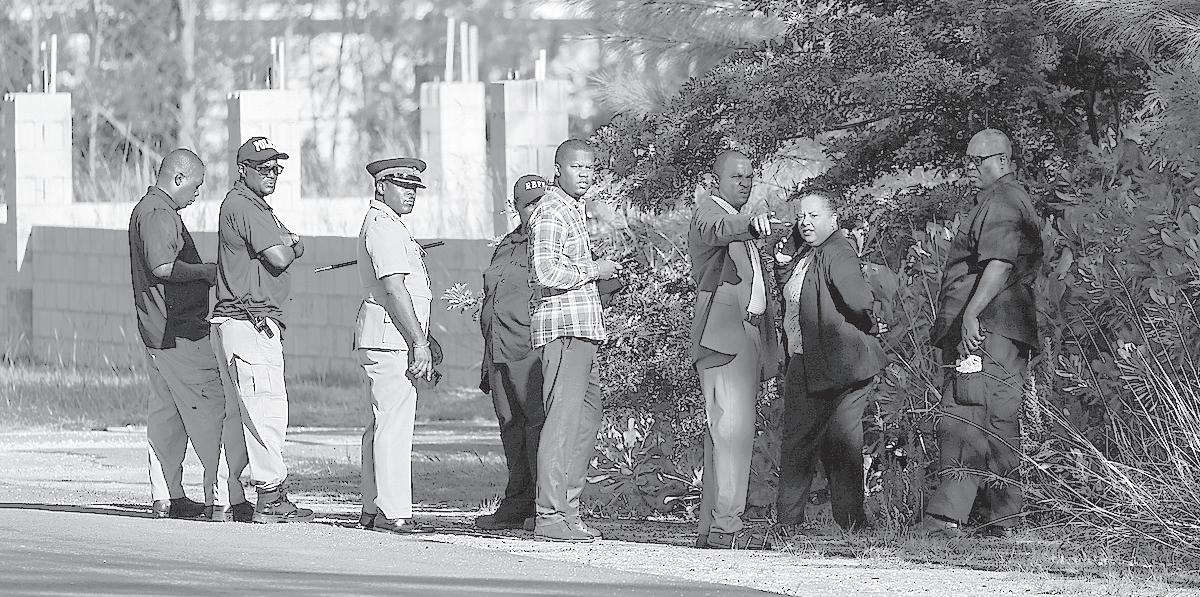
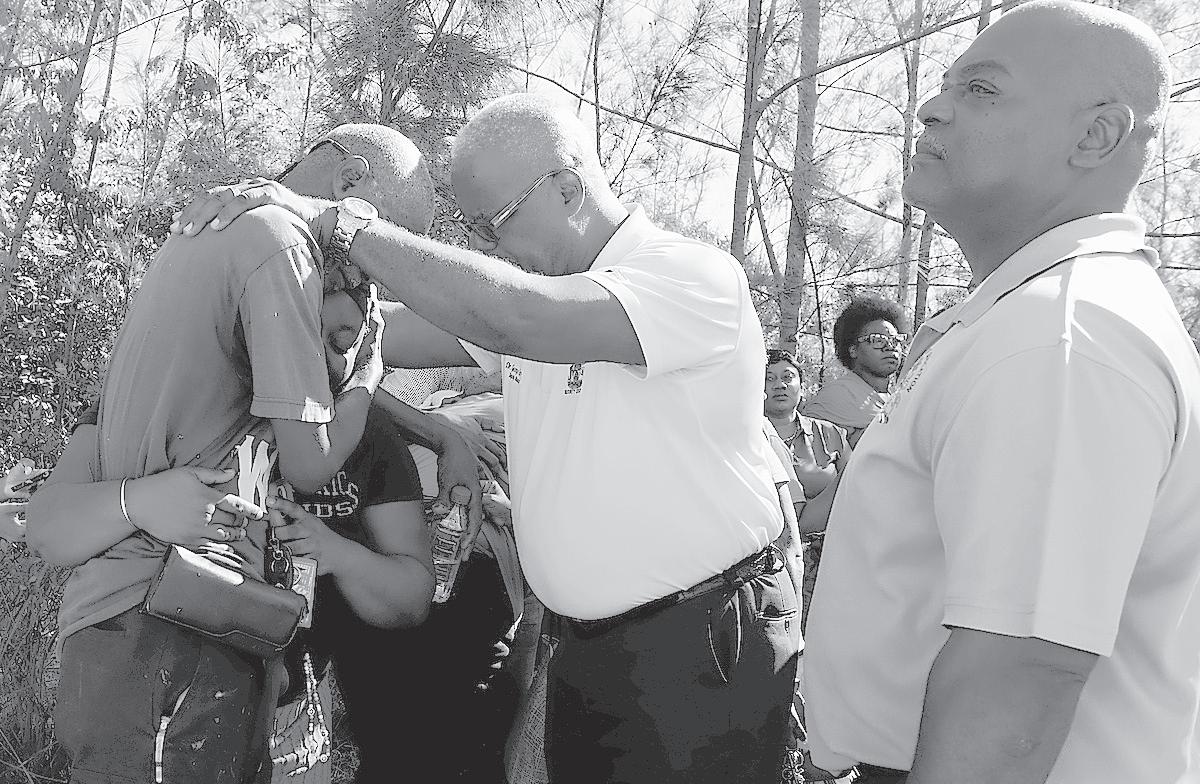

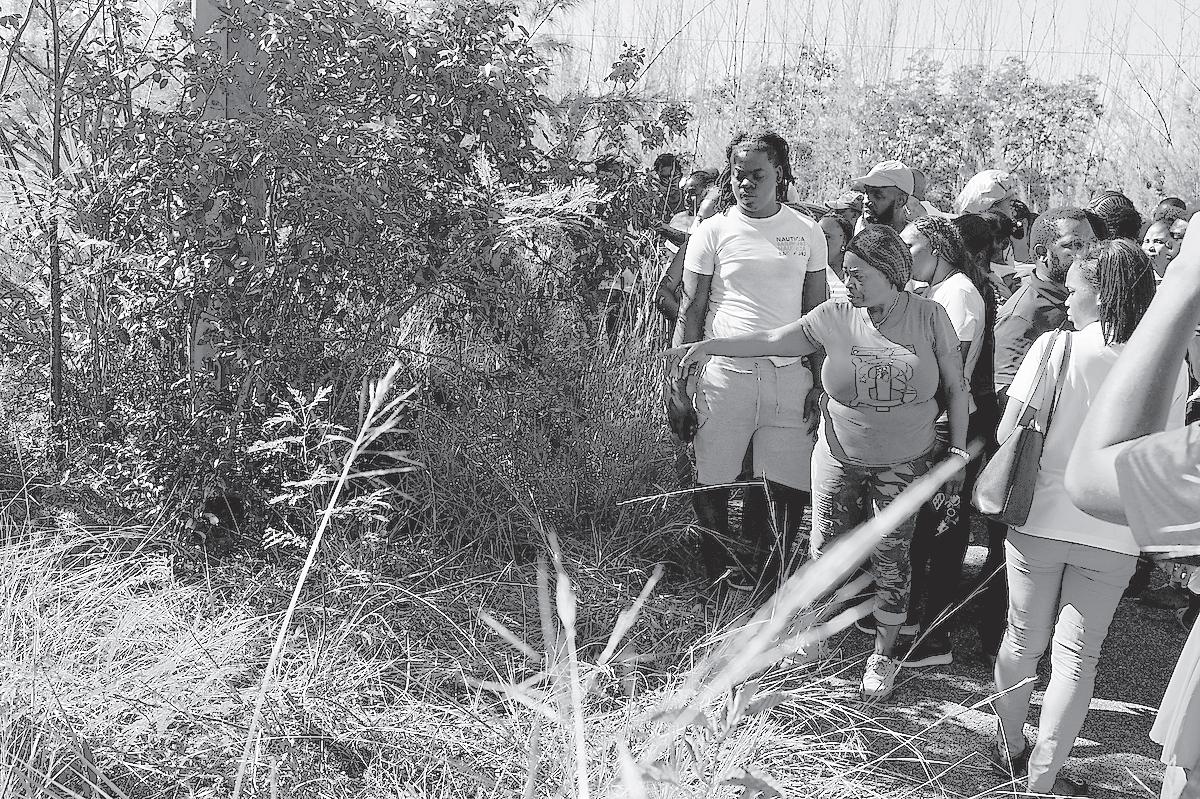

NULLIUS ADDICTUS JURARE IN VERBA MAGISTRI
“Being Bound to Swear to The Dogmas of No Master”
LEON E. H. DUPUCH
Publisher/Editor 1903-1914
SIR ETIENNE DUPUCH, Kt., O.B.E., K.M., K.C.S.G., (Hon.) LL.D., D.Litt .
Publisher/Editor 1919-1972
Contributing Editor 1972-1991
RT HON EILEEN DUPUCH CARRON, C.M.G., M.S., B.A., LL.B.
Publisher/Editor 1972-
Published daily Monday to Friday
Shirley & Deveaux Streets, Nassau, Bahamas N3207
TELEPHONES
News & General Information
(242) 502-2350
Advertising Manager (242) 502-2394
Circulation Department (242) 502-2386
Nassau fax (242) 328-2398
Freeport, Grand Bahama (242)-352-6608
Freeport fax (242) 352-9348
WEBSITE, TWITTER & FACEBOOK
www.tribune242.com

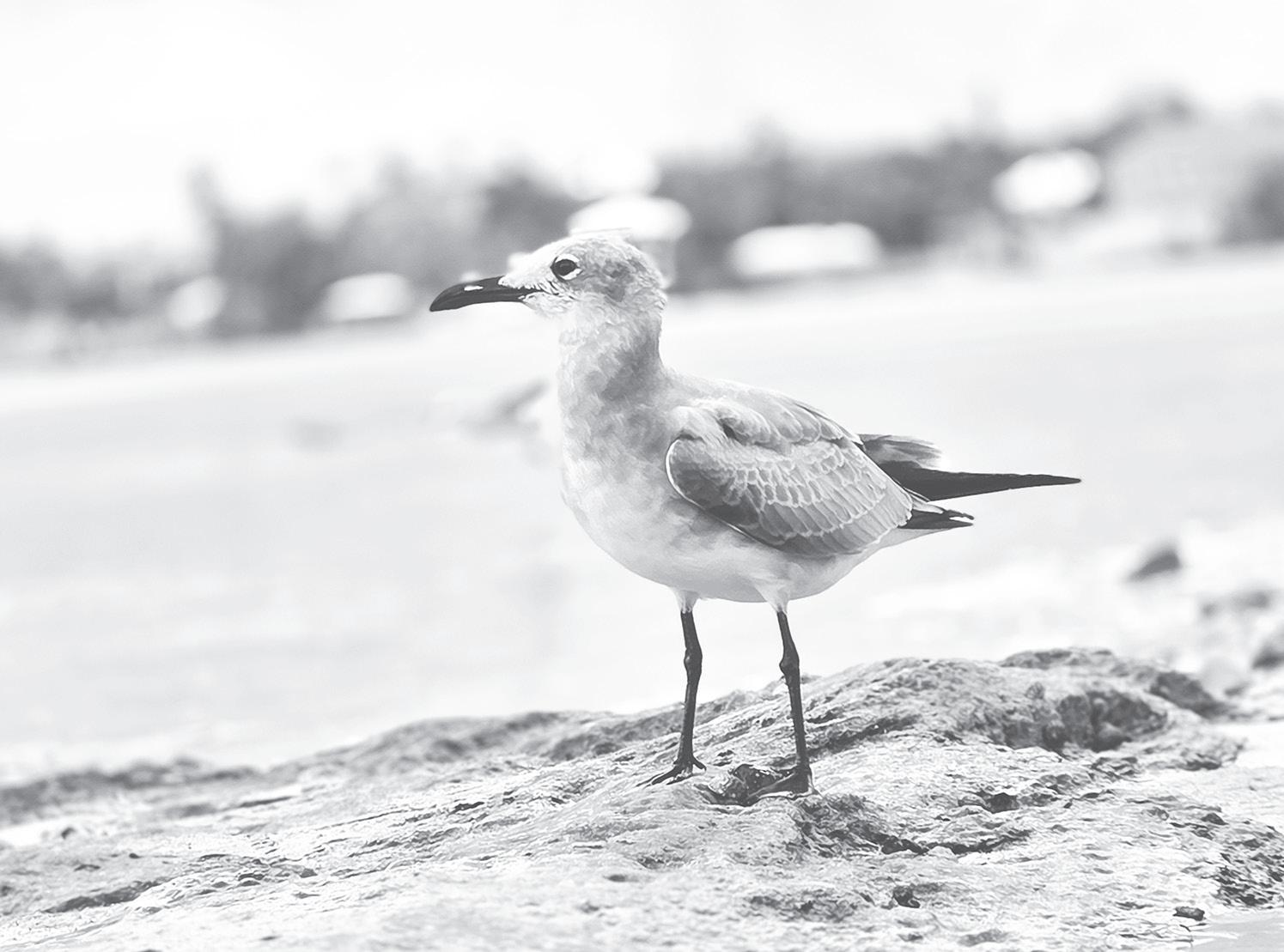
Have a cool, fun, interesting, amazing photo? Have it featured here in The Tribune’s picture of the day! Email your high quality image to pictureoftheday@tribunemedia.net A SEAGULL stands on the shore.


@tribune242 tribune news network
Cannabis boom in Africa good for wealthy but not for small farmers
CANNABIS is booming as an ingredient in everything from supplementary oils, inflammation-reducing skin creams, lip balms to health drinks and gummy sweets that promise to reduce anxiety and pain and promote relaxation.
The global legal cannabis market is today worth about US$69.78 billion, and this will skyrocket to US$216.76 billion by 2033.
But is this boom benefiting indigenous cannabis farmers in southern Africa? They’d been growing the plant for hundreds of years before colonial authorities criminalised it in the early 1900s. Rural people continued to grow it illicitly after that, relying on its medicinal properties.
For many rural households in southern Africa today, cannabis pays for the family’s food, education, and other necessities.
In South Africa, cannabis was prohibited under different laws since 1928. In neighbouring Zimbabwe, the Dangerous Drugs Act criminalised cannabis in 1955, and this continued after independence.
But in 2018, this changed. South Africa’s Constitutional Court decriminalised private use and limited private cultivation for personal consumption, while Zimbabwe regulated the cultivation of cannabis for medicinal and industrial purposes.
We are social scientists who research cannabis and development in Africa. We interviewed a wide range of people, from political leaders to illicit growers to cannabis lobbyists and nongovernmental organisations to technical people involved in the industry, such as greenhouse installers. We wanted to uncover the challenges small-scale cannabis farmers faced after cannabis was decriminalised.
Our research found that cannabis reform has continued old patterns of unfairness. For example, we found that medicinal cannabis production is currently an exclusive business which only well off businesses can participate in. Farmers who traditionally cultivated cannabis and sold it when it was still illegal have not been included in the new cannabis industry.
If these problems are not solved, the potential of cannabis to be a tool for development in Zimbabwe and South Africa will remain unfulfilled.
South Africa: privacy, rights and the slow turn to reform South Africa’s move towards legalisation was not triggered by the government but by the courts. The 2018 Constitutional Court ruling found that criminalising private cannabis use violated the constitutional right to privacy. The state couldn’t show a good enough reason to interfere with adults doing private things like smoking cannabis by consent, as long as no one else was being harmed.
This decision created a ripple effect. It ignited public debate about personal freedoms. It also sparked discussion about whether cannabis could help redress historical injustices, create jobs, and boost economies in rural areas where the plant has long been cultivated. Since then, however, reform has been slow and uneven. The government passed the Cannabis for Private Purposes Act in 2024. This sets out the amounts of cannabis that individuals can possess and grow. However, most commercial trade is in the tightly regulated medical and hemp sectors (hemp being Cannabis sativa with very low levels of THC, the active psychoactive cannabanoid). Trade in cannabis outside these sectors is mainly prohibited. Also, small-scale farmers – many of whom have cultivated cannabis for generations – face high barriers to entering the legal market. To set up a medicinal cannabis business in South Africa needs a licence from the health products regulatory authority. The cannabis farm has to meet high quality standards, and comply with strict manufacturing and agricultural practices. Cannabis farms are also inspected regularly.
Medicinal cannabis businesses esti-
mate that R3 million to R5 million (US$173,000 to US$289,000) is needed to start a farm. This high cost sidelines the very communities that kept the cannabis industry going when the plant was banned.
Zimbabwe: cannabis as a cash crop
Zimbabwe’s reform took a different route. The government legalised cannabis cultivation in 2018, but only for medicinal and industrial purposes. Recreational use remains illegal.
The government’s motivation was for cannabis to complement tobacco as an important cash crop. Officials projected a billion-dollar industry geared mainly towards exporting cannabis.
In practice, though, only wealthy investors can afford to set up cannabis export businesses. For example, a fiveyear medicinal cannabis licence costs US$50,000. On top of that, cannabis farmers must pay substantial annual inspection fees and licence renewal fees.
Our research also found that the cost of greenhouses prevents small-scale farmers from starting cannabis businesses. Medicinal cannabis farmers are required to use greenhouses to control temperatures, humidity, pests and contamination. A greenhouse installer we interviewed said one of their cheaper versions cost US$220,000 for a five-hectare plot.
Unsurprisingly, the main people who have benefited from cannabis law reform have been established local business people and foreign investors. Small-scale cannabis farmers – the backbone of Zimbabwe’s cannabis trade for decades – remain excluded. Many continue to grow it illicitly. This sustains domestic illegal markets and means these small farmers don’t benefit from the promised green gold.
In both countries, corporate capture of the cannabis industry is looming. Well-capitalised companies, often with international backing, are able to afford the costs of meeting regulatory standards. They also have the funds to sell cannabis on the export market. If the cannabis industry is taken over by corporations, profits will be concentrated in a narrow elite rather than growers on the ground.
Both countries are also struggling with the contradiction between reforming cannabis laws and international drug controls which still classify cannabis as a prohibited substance. This complicates efforts to develop export markets and creates uncertainty for investors.
Why inclusion matters
Excluding smallholder farmers who’ve farmed cannabis for decades perpetuates inequality. It also undermines the sustainability of reform, because illicit markets will continue to thrive if ordinary cultivators see no benefit in moving to the legal sector. More inclusive models are possible. These could include tiered licensing systems with lower fees for small-scale farmers.
Cannabis producer co-operatives can also enable their participation, as is the case in Morocco.
Communities and commercial investors should partner to strengthen one another. They can form joint ventures where communities provide labour and knowledge of local climatic conditions and cannabis varieties while investors provide funds and ensure regulatory compliance.
These ventures would recognise the contribution of traditional cultivators while still ensuring cannabis quality and safety in the legal market.
The next phase of reform in both countries must focus on including smallscale farmers. Laws must be passed to balance the commercial opportunities that come from selling cannabis with the rights and livelihoods of small-scale cultivators.
By Simon Howell and Clemence Rusenga The Conversation
EDITOR, The Tribune
I WANT Bahamians to envision our Bahamas as a place recognised not only for its sun, sand, sea, and service but also for its trustworthiness. Michael C Pintard’s plan for constitutional data privacy, data protection, and data sovereignty could help us achieve this vision. In simple terms, it means having clear rights over our personal information, strong regulations on how it is used, and firm control over where it is stored. This would make our country safer, fairer, and more competitive. This is about sovereignty in the 21st century. In the past, power was derived from land, ships, or money. Today, power increasingly comes from data, the information about our lives, health, work, and ideas. When we include these rights in the Constitution, we transition from promises to guarantees. Every Bahamian would own their personal data and have a clear say in how it is used, even if it is stored on a server located outside our islands.
A strong data management regime can stimulate economic growth. With clear regulations and an independent regulator, The Bahamas has the potential to position itself as a Digital Trust Hub for the region. Banks, hospitals, universities, and tech companies seek locations with reliable laws and secure systems. If they can store information here under Bahamian legal protections, it will attract investment and create jobs. This could lead to increased opportunities in fields such as cybersecurity, cloud operations, software development, and data analysis, providing valuable career paths for our young people.
Small businesses would also benefit from a clear regulatory framework. Many local firms lose contracts because partners require strict privacy
standards that they are unable to demonstrate compliance with. A national framework that includes “safe harbors,” phased timelines, and training programs would help these businesses meet the necessary standards without fear of repercussions. For minor mistakes, the emphasis should be on education and fair fines rather than imprisonment. This approach allows us to raise standards without overwhelming entrepreneurs.
This vision promotes inclusion across all islands. If BTC, Cable Bahamas, and Aliv collaborate on a national network plan, we can provide secure broadband and digital services to more communities. Parents will be able to trust electronic health records.
Family Island Farmers can use simple sensors to enhance their crops and secure fair prices. Students could carry digital credentials that facilitate their applications for schools or jobs anywhere.
Trust in government is essential. Privacy should go hand in hand with transparency. The same law that safeguards citizens’ data should also enhance Freedom of Information and mandate public disclosures about data breaches and ministerial exemptions. Establishing clear rules, conducting annual audits, and ensuring independent oversight demonstrate that the law applies to everyone, including those in positions of power.
This plan would also enhance our resilience. Hurricanes and power outages remind us of the importance of protecting crucial data, such as medical records and land titles. A constitutional framework would encourage us to establish secure data centers domestically,
implement strong encryption, and create response teams for cyber threats. Furthermore, it would facilitate the signing of agreements with international partners to ensure that legal data flows continue during challenging times.
Finally, it puts Bahamians at the center of the AI era. Every AI system learns from data. If our data leaves without rules, so do the benefits. A sovereignty framework can require ethical AI practices, protect sensitive information like DNA, RNA, and Biometrics, and ensure that when our data helps create value, Bahamians also gain. Some people are concerned that this will lead to more bureaucracy. However, what it actually means is the implementation of sensible regulations, clear guidance, standardized forms, online tools, reasonable timelines, and fair penalties for those who do not comply. Additionally, it offers support for small businesses. In exchange, we benefit from stronger rights, increased trust, and improved job opportunities. We face a choice. We can either adopt the rules set by others and face the consequences, or we can create our own rules, embed them in our Constitution, and foster trust on a global scale. We have previously excelled in tourism and financial services; now, we have the opportunity to lead in something truly unique and valuable: digital integrity.
If we choose this path, our children will inherit not only beaches and passports but also a digital future that reflects their rights and talents, owned, at last, by them. Critical Thinker A Bahamian for a Trusted Digital Future.
CRITICAL THINKER Nassau, October 22, 2025

BY-ELECTION from page one
Parliamentary Registration Department, informed the House of Assembly yesterday that notice of an election had been received.
Parliamentary Commissioner Harrison Thompson said the process is now underway following the GovernorGeneral’s issuance of the writ in accordance with the constitution. He said nomination day will be held on October 31 between 9am and 12pm at Anatol Rodgers High School, and the register of voters for the constituency is now closed to new registrations and transfers.
Golden Isles, one of the two largest constituencies in the country, is considered a swing seat. The upcoming poll will be interpreted as a test of the Davis administration’s popularity as it nears the end of its term.
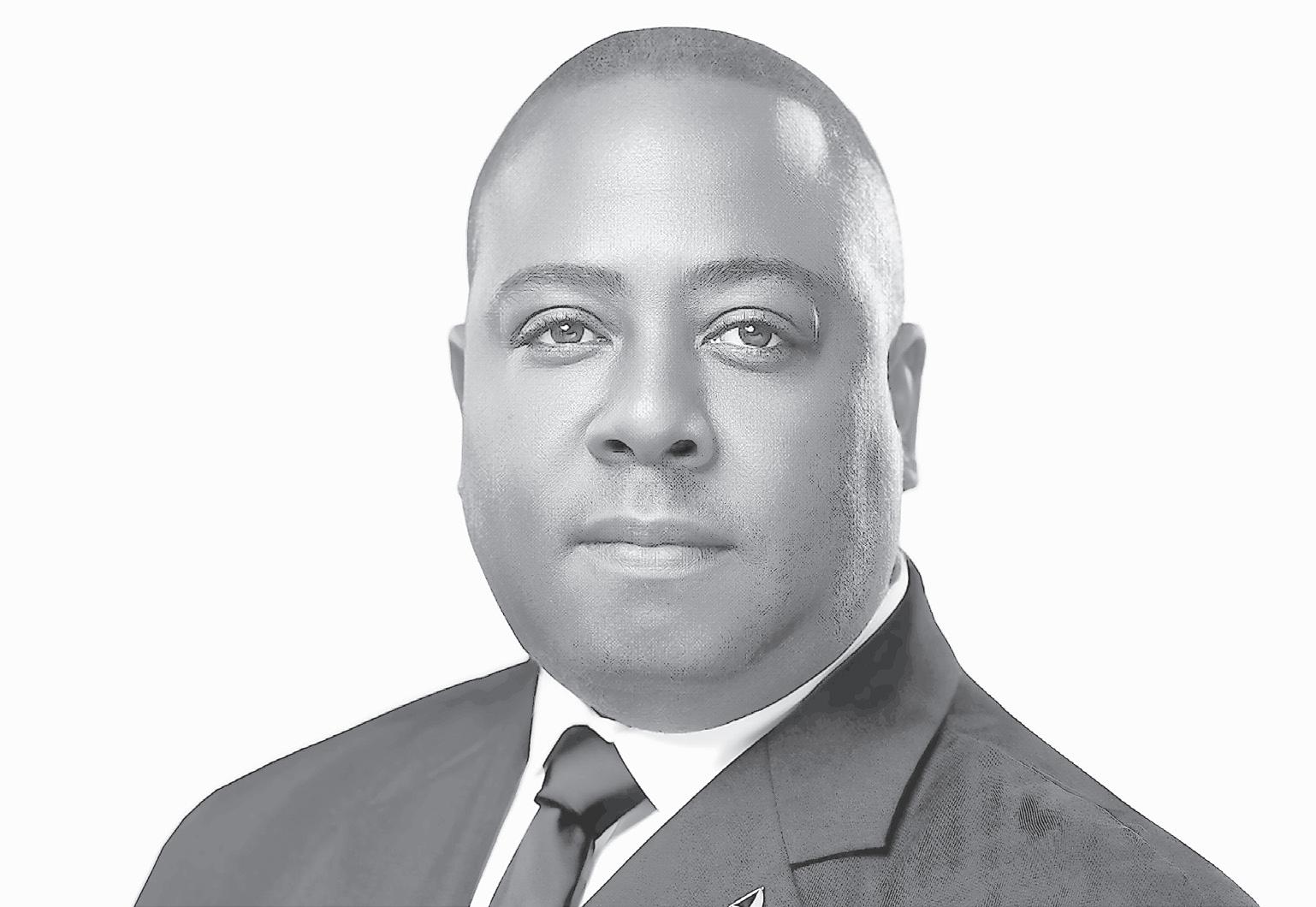

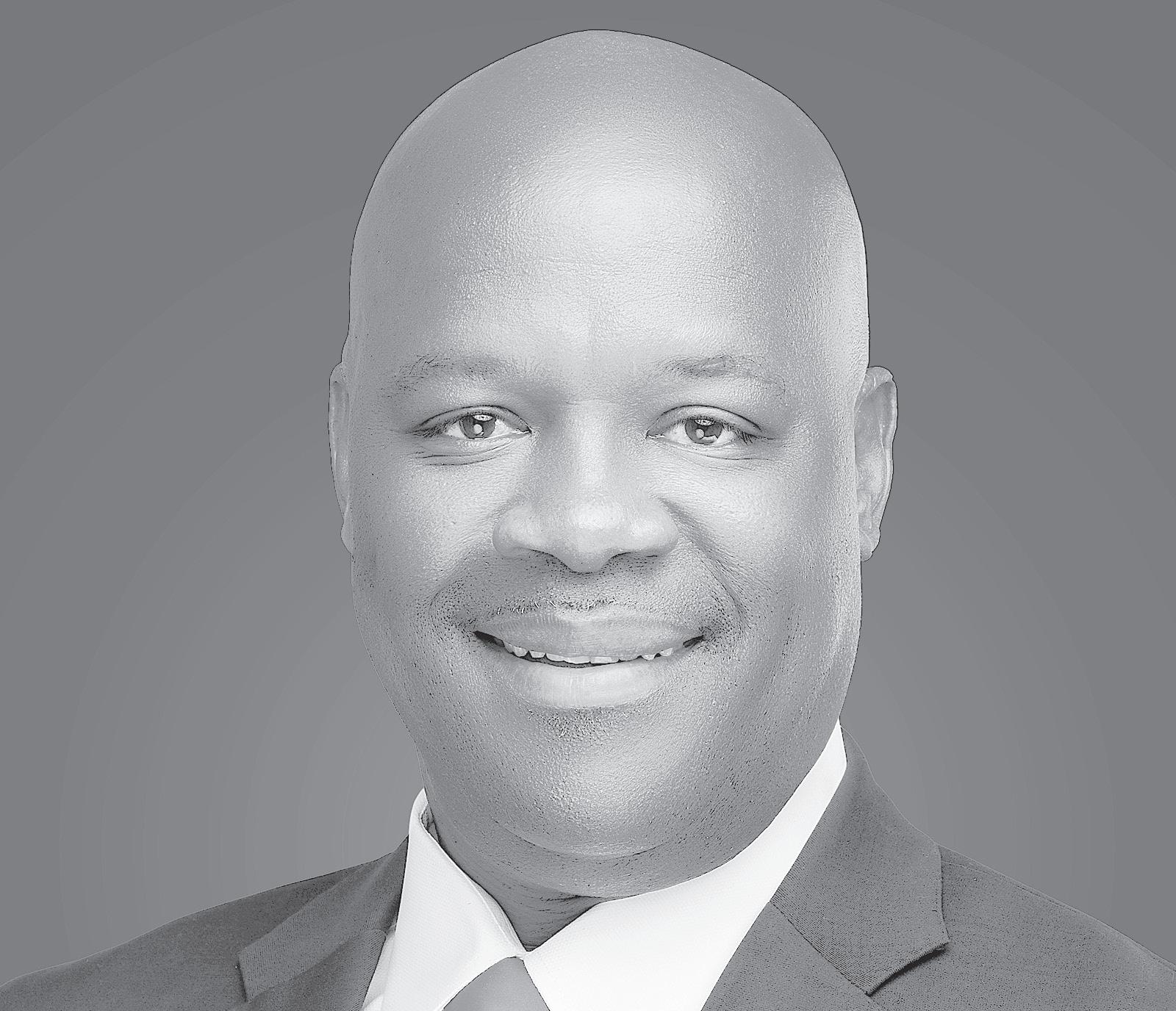
By KEILE CAMPBELL Tribune Staff Reporter
HOUSING and Urban
Renewal Minister Keith Bell has insisted that The Bahamas does face a housing crisis - rejecting suggestions from Fidelity Bank CEO Gowon Bowe that the problem stems from poor use of existing homes rather than a shortage of supply.
Mr Bell, speaking outside the House of Assembly, said Mr Bowe’s comments, based on Bahamas National Statistical Institute (BNSI) data showing more than 25,000 vacant residential units nationwide, were a “generalisation” that overlooked key factors.
“I think that it didn’t take into account the Airbnbs to rentals being rented, and so, the reality is, we do have a housing crisis,” he said. “We have an increased population, but we have
not necessarily increased our housing stock, so we seek to address that.”
The minister said his ministry is partnering with the private sector to expand available housing, noting that several subdivision projects are already underway.
“We began the Adastra Gardens Premier Estate Subdivision, we started the Vinspen Road Subdivision off St Vincent Road, and of course, our premier subdivision, which is Renaissance, we continue to build that subdivision, which is 300 plus homes,” he said.
He added that Family Islands are also being prioritised, with homes under development in Abaco and plans advancing for Andros, Eleuthera, San Salvador, Cat Island, and Grand Bahama.
“This is, of course, coming against the backdrop where the former
administration built no homes during their administration,” Mr Bell said, adding that the ministry is now working with the Ministry of Works to obtain occupancy certificates for upcoming projects.
The Tribune previously reported Mr Bowe’s view that the country’s housing challenge stems not from a shortage of homes but from underused and distressed properties. Citing the BNSI data, which found 25,060 vacant homes — 17.4 percent of all dwellings — Mr Bowe argued that government policy has focused too heavily on the optics of new construction.
He said successive administrations have preferred handing over keys rather than rehabilitating and repurposing abandoned homes, which he described as a more sustainable and economically sound approach to meeting housing demand.

THROUGHOUT history, elites tend to live in bubbles, cossetted by creature and other comforts. These are not translucent bubbles through which one can see beyond one’s isolation or limited worldview.
The bubbles and circles of the elite are often made of concrete, steel, gold, diamonds, and other material which cut them off from the daily struggles of the mass of people. Many in the elite are often kind and generous people, though there are just as many who are indifferent and callous.
Elites tend to socialise with others in their social class or political affiliation. They tend to reinforce each other’s opinions, conceits, mindsets.
In The Bahamas they often do not understand what is going on in the country because they do not read the news in depth or speak in-depth with those not in their circle of circular thinking. Bubbles are echo chambers.
Even if one is compassionate and concerned for others, it is easy to fail to appreciate the challenges of others who cannot afford rents, mortgages, light bills, medicine, car payments, appliances, and other necessities.
Then there is the bubble or rarefied environment of the cabinet room and parliament which leaves one intoxicated and driven by magical thinking.
In The Bahamas, many of the elites and super elites flaunt their material wealth, constantly perfuming the air with their privilege. There is a smug narcissism designed to trigger envy in others.
It recalls the line from that well-known song, “I’m a better woman than you.” Substitute the word “women” with “person” and one gets what many are communicating by flaunting their consumerist excess. It is often those with the proverbial

new money who show off the most.
The recent images of the PLP candidate for Fort Charlotte, Sebas Bastian, showing off his new campaign buses is but another gross and obscene example of advertising one’s wealth as many Bahamians are in desperate financial straits.
A friend recalled an economic briefing with a high-ranking government official a few years ago. She recalled that many of the wealthier older money participants and some others were driving modest cars and trucks, while quite a number of bourgeoise professionals were driving luxury cars with high monthly payments.
With our proximity to and constant bombardment of advertising by the hyper consumerist culture of the US, Bahamians have material expectations often greater than that of our Caribbean neighbors.
One of the reasons Hubert Ingraham and the Free National Movement won back-to-back elections from 1992 to 1997 was because of the high growth in the country during that decade. No government has come close to that level of growth since.
While there were myriad reasons that
former Prime Minister Perry Christie was ejected from office, a primary reason was that his government could not meet the economic expectations and demands of many Bahamians, which Christie realised and publicly acknowledged after his second loss.
These demands include jobs that pay decent wages, affordable housing, help with healthcare, and a range of other economic needs. In The Bahamas, especially New Providence, Bahamians see upfront and on a daily basis how the upper middle class, the wealthy, and tourists live in luxury hotels.
Proximity can breed anger and resentment that one cannot afford the lifestyles of others. The appearance or flaunting of wealth, luxury cars for cabinet ministers, ostentatious homes, and other signs of privilege, juxtaposed to how the majority of Bahamians live, may be a reason that Bahamian voters are often angry and ready to dismiss a government.
As noted last week, currently in Nepal, Madagascar, the Philippines, and Morocco, citizens, especially younger and Generation Z protestors, are sickened by political and economic elites indifferent to their daily struggles and survival.
They have gone to the streets to demand economic relief and advancement as “entrepreneurs” with monopolies and hands in numerous businesses, giddily flaunt their wealth and power, with little selfawareness or restraint.
Bahamians do not tend to participate in demonstrations for a variety of reasons, including not wanting to be victimised.
Still, when they see others demonstration there is a vicarious solidarity. They feel their anger being vented by others because they too would like to say, “Screw

(a
euphe mism) the politi cal class.”
R 2016 Black Friday dem onstrations that presaged the public mood that even tually fully erupted and threw the Christie government out of office.

“I don’t know what people mean when they say making ends meet, because I don’t know where the end supposed to be!” The anger against the elites is nonpartisan.
While the recent demonstrations to Parliament Square by two unions is not the same type of demonstration, there is a compelling parallel: Demonstrations are often a sign to the larger voting public and an example of the public mood. Such moods can be contagious especially in a small country.
There are many angry Bahamians who are struggling financially and who, as in the past, believe that the political and economic elites are cohabitating in bubbles, disconnected from what the majority of Bahamians, including the proverbial grassroots, are experiencing.
As one voter told this columnist: wBoth the PLP and FNM brands are in decline. Bahamians do not believe that either party has a vision to significantly improve their economic prospects.
Some look with curiosity to the bombastic populist gadfly Lincoln Bain as a means of expressing dissatisfaction with the major
parties.
Recently, Bain’s standing has taken a massive hit because of his increasingly more bizarre antics.
While Bain and his oddly named Coalition of Independents will garner votes this election, it appears that many Bahamians are turned off by him and would rather not vote, than vote for someone whom they believe is undeserving of their support.
Another name for anger is rage. Rage is historic anger. There is a rage in many Bahamians that their economic plight will not significantly improve.
With lowered expectations of politicians and high expectations for what they need, many voters may still be debating their choice for the next election.
Thus far, neither party has articulated an economic and social vision with compelling and believable ideas to respond to the great needs of a country beset by dysfunction, social decay, inequality, and a lack of sustained economic growth and prospects.
Lincoln Bain has made many unrealistic promises that may attract some. Nevertheless, there remains a desire for a message of genuine change and hope for the mass of Bahamians desperate for a truly new direction that serves more Bahamians, beyo“I don’t know what people mean when they say making ends meet, because I don’t know where the end supposed to be!” The anger against the elites is nonpartisan. nd the elites in their bubbles, many of whom do exceedingly well no matter who has temporary political power.


$230 MILLION is a pretty big number. We can probably all agree on that. It may be coincidence, but two unrelated-looking developments this week both seem to involve that humongous sum.
Beginning Monday earlier this week, construction activity began at the expansive downtown Washington DC campus of the White House. While security fencing largely screens off most of the north- and east-facing sections of the expansive property, sharp-eyed visitors spied a major project visibly underway at the White House.
The East Wing was being demolished.
According to news reports, demolition crews have begun tearing down the East Wing of the White House to build US President Donald Trump’s long-desired ballroom despite his pledge that construction of the approximately $230 million addition wouldn’t “interfere” with the existing building. The East Wing was first added to the presidential mansion in 1902.
It won’t interfere with the current building. It’ll be near it but not touching it — and pays total respect to the existing building, which I’m the biggest fan of,” Trump said during an executive order signing in July.
“The White House is my favorite. It’s my favorite place. I love it.”
The president may love the White House, but he evidently intends to make changes to make it more closely resemble Mar-a-Lago, his expansive property on South Ocean Boulevard in Palm Beach.
According to other news reports, Trump recently reviewed in some detail his planned ballroom during a dinner with executives from the tech, finance and defense industries, telling them that the project was fully

financed after receiving donations as large as $25 million from dozens of companies, including Apple, Amazon, Lockheed Martin (a giant US defense contractor) and Coinbase, a secure online platform for buying, selling, transferring, and storing cryptocurrency.
Critics immediately seized upon this event as further evidence that Trump, an acknowledged admirer of the control exercised over Russia’s wealthy minerals-sustained oligopolistic titans by Russian president Vladimir Putin, continues with his increasingly successful efforts to emulate his Russian counterpart.
But despite these reported offers to pay for Trump’s ballroom, another development appeared to point to a different financing method. At almost the same time that the ballroom became the latest polarizing, controversial Trump initiative to capture US attention, the president’s staff leaked the information that he was contemplating directing the US Department of Justice to compensate him for expenses – including damages to his reputation – incurred during the several federal investigations into his and his campaign’s alleged misbehavior leading up to and including his first term in office.
Those investigations, which Trump has insisted are unconstitutional judicial misbehavior, included Robert Mueller’s probe into Russian efforts to influence the
2016 presidential election in Trump’s favor; two different impeachment trials initiated in the thenDemocratic controlled US House of Representatives, and a variety of state and federal lawsuits targeting Trump during his four years out of office from 2017-21.
Maybe you have heard estimates of the sum Trump is reportedly seeking from the government in recompense?
It’s $230 million.
This story gets more interesting. It turns out that the key official in charge of authorizing such a giant payment to Trump, likely without further reference to anyone not under her direct supervisory control, is Attorney General Pam Bondi. Bondi’s willingness to comply with Trump’s wishes has been well established since she took office on February 5. Supreme Court justice Clarence Thomas administered her oath of office.
Trump certainly does love the shock effect his actions and words so often elicit. And he has a unique talent for unveiling his stunning pronouncements with a calculating deadpan delivery. It’s easy to imagine his glee as he contemplates the indignation as his many foes bluster in (so far) feckless opposition.
ELECTIONS COMING SOON
Almost since the results of last November’s presidential election revealed Trump’s decisive win over Kamala Harris, millions of Americans frustrated
at his reelection began targeting November 3, 2026, the date of the next American general election when every one of the 435 seats in the House of Representatives and one-third of the seats in the US Senate will be on the ballot across the country.
Surely then, many hope, control of the American legislature will shift away from the White House and the US constitutional system of checks and balances will be restored.
Also, Trump will truly be reduced to lame-duck status and unable to exert such profound control over the elected members of the Republican Party.
Maybe that will happen. Meantime, there will be a few elections ten days from this morning that may provide insight into next year’s results. The headline events are the quadrennial votes for governor in New Jersey and Virginia. We’ll get to those in a moment.
There’s a House election in November that is likely to attract some attention too, though not due to any suspense about its likely outcome.
The seat in question represents a close-in district in Houston that has long been held by Democrats and that isn’t expected to change this year. But that isn’t the end of this story.
At the moment, the Republicans hold a 219213 majority in the House.
A Democratic incumbent from Arizona’s southernmost district, Raul Grijalva, died in office earlier this year and his
daughter Adelita was chosen as his successor in September. Her election was certified a couple of weeks ago, but House Speaker Mike Johnson has refused to allow her to be sworn in. This normally happens as soon as the new member’s family can get to Washington to attend this meaningful ceremony. He has fussed and fiddled around trying to justify his intransigence, but it does look as though Johnson is behaving this way in order to keep M s. Grijalva from signing a petition that would then contain the names of a majority of the House (including a couple of renegade Republicans) and demands that the ‘Epstein file’ be released. Without Grijalva’s signature, proponents of the file release don’t have a majority.
Democrats and the millions of Trump opponents have clutched at the issue of releasing reports on investigations of disgraced pedophile, human trafficker and multi-millionaire (and longtime Trump friend) Jeffrey Epstein, in the hope that these reports will somehow besmirch Trump and weaken M AGA support for the president.
Bondi and other Trump appointees have handled the issue maladroitly, to say the least, and the result has been a potential embarrassment for Trump in the eyes of his rabid supporters in the Make America Great Again movement. Anyhow, Grijalva will eventually be seated. The US government will reopen fully. And we will see what happens next.
But the Houston district vote November 5 has significance for two reasons.
First, it’s a runoff between three Democrats and one Republican. One of the Democrats will win, but if someone doesn’t win at least 50 percent of the
vote next Tuesday, there will be a runoff later and this key additional ‘Epstein files’ vote will be further delayed. But if one Democrat wins a simple majority, we could see another potential Epstein petition voter in the House.
There’s still another wrinkle here. In the Lone Star state, Republicans at the urging of the president have been very publicly trying to change some of their own recent work to redraw the state’s House of Representatives districts to shift as many as five of the state’s 38 congresspersons from the Democratic to the Republican column. If they succeed, that would likely affect the Houston-area blue seat. The Supreme Court may decide.
Now let’s get back to New Jersey and Virginia. In both states, attractive centrist-leaning Democratic women are running against pretty hardline Trump supporters. In most recent elections New Jersey and Virginia have trended blue, and despite pundits’ attempts to drum up interest in these contests, few expect an upset. Accordingly, the pundits and cable news readers have tried to inject eyeball-attracting suspense into the elections by casting these votes as referenda on Trump’s second presidency and as predictors of next year’s elections.
A well-respected analyst wrote that “both gubernatorial contests are tests of the brand that Democrats believe is best suited for their comeback next year. The brand Democrats are selling in 2025 is moderate-liberal, national security-experienced politicians who are known more for policy preferences than fiery rhetoric.
“If the Democrats don’t win both handily, the party will have to change strategy for next year.”
By KEILE CAMPBELL Tribune Staff Reporter kcampbell@tribunemedia.net
SOCIAL Services Minister Myles LaRoda said his ministry has long assisted a mother of two autistic children recently forced to sleep in her car, but admitted that limited shelter capacity continues to hamper efforts to house vulnerable families.
He said the ministry has been helping Ameca Ford McKenzie, 47, and her two sons for some time, with records of its involvement dating back to 2021.
“I saw the dated case history dating back to 2021, and I say based on my advice of written reports and speaking with senior management of social services, I am prepared to put on record that Social Services has done a good job in documenting the assistance given, multiple types of assistance, along with help from private entities,” he said.
He said the demand for shelter has grown significantly in recent years, noting that stays which once lasted only a few days now stretch much longer as more people seek help. He recalled that when the government leased the Poinciana Inn, it was
able to provide accommodation for up to three months, unlike other facilities that are paid for daily.
He said the government intends to rent two more facilities to help meet the growing need for housing assistance.
He noted that homelessness is not limited to the unemployed, with some working Bahamians also struggling to cope with rising rent costs.
“Working people, which we can define as the working poor, have just had their rents raised on them exponentially,” he said. “A constituent came to see me who is renting a room that she shares a bathroom for, for $800. These individuals just need shelter temporarily to save enough money for their first, last, and security deposit on another apartment.”
Mr LaRoda dismissed suggestions that migrants are prioritised over Bahamians for assistance, describing such claims as “absolute rubbish.” He explained that under the law, foreigners only qualify for emergency help, such as shelter, during natural disasters or other extreme emergencies.
AUDIT from page one
Davis, at one point, even alleged that a non-profit organisation went on “a spending spree,” using public funds meant for pandemic food assistance to purchase two high-end trucks and boats.
The Office of the Auditor General’s report, tabled in the House of Assembly yesterday, addressed this but made no finding of wrongdoing.
This is the second audit to clear food programme officials of misusing public funds. A report by Kershala Albury, president of ATI Company Ltd, had previously identified “18 categories of major deficiencies,” mainly relating to procedures, processes, and internal controls, but found no evidence of financial misconduct.
The latest report flagged similar concerns with internal controls and noted duplication of efforts between the food distribution programme and the Department of Social Services, including cases where recipients received benefits from both programmes.
However, it found the initiative largely met its goals, despite earlier concerns over spending and management. In fact, the auditor general lauded officials, saying the 70-week effort to feed vulnerable people “stands as a testament to the power of collective action.”
“The effectiveness of the NFDTF was made possible by the unwavering dedication and tireless efforts of all involved,” the auditor general said in his performance audit of the programme, adding: “The most vulnerable did not go hungry.”
While confirming that an NGO purchased a Ford F-550 truck, a Hilux truck, a Serena van, and computers, the report highlighted the organisation’s claims that none of the trucks were funded by the government.
The NGO is quoted in the report as saying the Ford F-550 was bought for $47,000 from a supporter donor, who provided a $15,000 discount, with no duty applied.
They also argued that the Hilux truck was a donation in kind, while the van was bought by other donated funds.
The organisation said the trucks were used to ensure food security across the island.
Other vehicle, cellphone, and computer purchases were also reviewed, with the NGO saying these items
Outside of those situations, temporary shelter is reserved for Bahamians. He added that while The Bahamas is bound by international treaties guaranteeing basic rights like education and healthcare, these protections do not extend to general housing assistance.
The Coalition of Independents provided temporary housing assistance to Ms McKenzie and her children. Ms McKenzie, who works as a security officer, said she fell behind on rent after months of financial difficulty. She said that when she reached out to the Department of Social Services for help, officials told her there was a wait list for assistance. “They had put me on hold because they said that they have a lot of people who were in front of me,” she said. “They had no place, but when they get something, they would let me know.”

were bought with “other sources.”
The non-profit organisation highlighted the need to establish help desks and collaborate with helplines for taskforce personnel, as well as the need for computers to review and register recipients on the Rapid Bahamas portal, particularly those who may not have been technologically proficient due to age.
The NGO said the other vehicle purchases were made to meet increased transportation demands, as distribution sites were spread across multiple designated zones.
The report also noted that reference was made to the Taskforce chairman’s discretionary power to approve the purchase of communication and data service assets, such as computers and cellphones, for use in the food distribution programme. Regarding a $4,500 vehicle purchased from the programme’s funds, the auditor said the taskforce chairman claimed the purchase had not been declared to the taskforce, but the Ministry of Finance has been informed of the purchase. The vehicle is still being used by the NGO for service delivery, and approval has been granted for the organisation to retain it for this purpose.
The report recommended that government emergency relief and public-private partnership programmes adopt clear expenditure controls, including fixed asset policies and procedures to ensure accountability and transparency. It also advised that emergency transportation fleets be managed within the relevant ministries or agencies to allow for rapid mobilisation and readiness during crises or disasters.
The report further stressed that national programmes responding to shocks or disasters should have proper reporting controls to communicate results to stakeholders. At the national level, comprehensive financial reporting — including programme outcomes and metadata — should be required.
The report also recommended that the government create an integrated data management system to better identify and verify recipients, helping to prevent fraud, abuse, and waste of resources. It noted that NGO officials were unable to determine whether some people received duplicate assistance, including from the Department of Social Services.
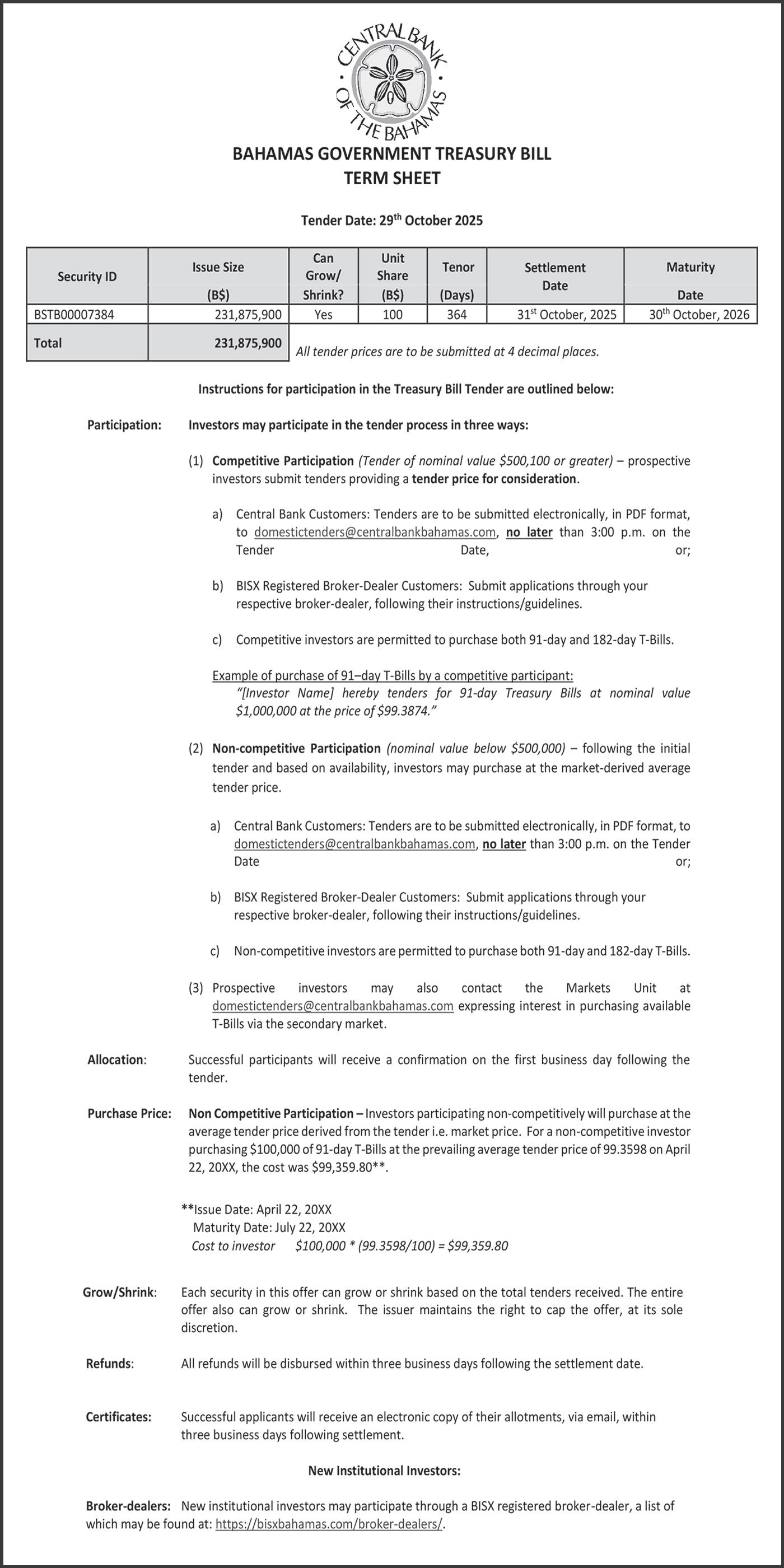
By RASHAD ROLLE Tribune News Editor rrolle@tribunemedia.net
FORMER Prime Minister Dr Hubert Minnis yesterday criticised the Davis administration for what he called a sluggish response to worsening road conditions across New Providence, saying the growing number of potholes has become a safety hazard for motorists.
Dr Minnis said the persistent rain in September and the recent tropical storm had exposed the government’s poor maintenance of the island’s road network, with countless deep craters now damaging vehicles and endangering lives.
“The persistent rain in September and the tropical storm led to significant potholes emerging across our road network in New Providence,” he said in the House of Assembly. “These potholes are numerous and dangerous. They can cause vehicles to lose tires or wheels due to the number of them and their depth.”
He noted that conditions worsen during heavy rain when water conceals the potholes from drivers, increasing the risk of accidents.
“The potholes become especially dangerous when there is rain,” Dr Minnis said. “The water covers them, making them invisible to unassuming drivers. Some of the potholes are so deep that they could cause serious accidents. The government needs to move more aggressively to patch the potholes in New Providence. The current speed of repair is not
good enough.”
He questioned why repairs only seem to begin after widespread public complaints, noting that residents have taken to social media in frustration.
“Bahamians are complaining all over social media about this issue,” he said. “The prime minister says the government has a lot of money. If so, then there should be no problem in executing the necessary contracts to ensure that the road network is in better shape.”
He said pothole repair should be a continuous process, not one that waits for crises to emerge.
“This is a problem that should never arise,” he said. “If the island is split into zones and the contractors know their areas, they should always be moving around to patch the holes.”
Dr Minnis cited a Tribune report this week detailing the growing public frustration with road conditions across the capital. The report noted that tyre shops and mechanics are “swamped with customers” as crumbling streets, worsened by rain, wreak havoc on vehicles from Carmichael Road to Robinson Road and across much of the island.
It also recalled the Ministry of Works’ 2022 announcement of a two-year, 55-mile paving programme intended to reduce potholes by mid-2025, following a survey that rated most roads in poor condition. Despite those assurances, residents across New Providence and the Family Islands continue to complain about deteriorating roads and costly repairs.

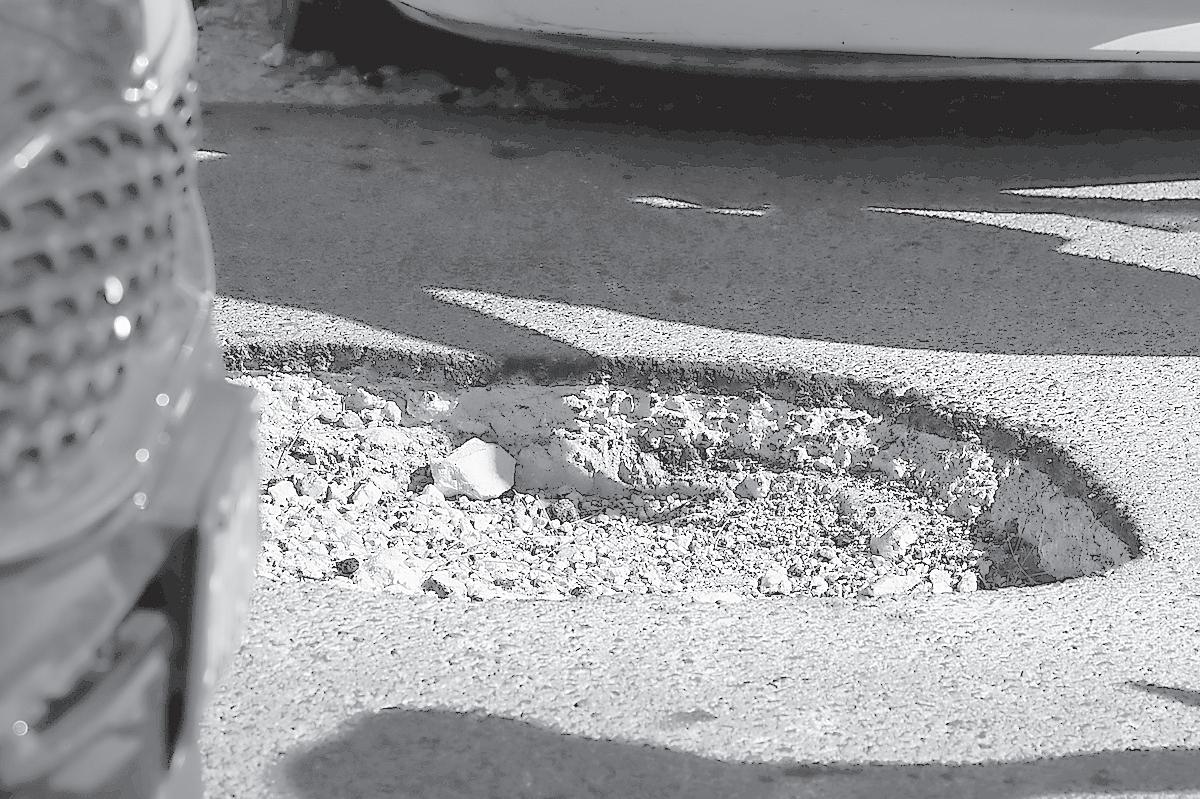

By PAVEL BAILEY Tribune Staff Reporter pbailey@tribunemedia.net
A FORMER death row inmate was resentenced to 35 years in prison yesterday for a 1990 murder.
Ricardo Farrington, 59, fatally shot Raynard Richardson on May 15, 1990 in Klonaris Acres.
Farrington shot the victim in the head with a shotgun after Richardson and another man circled him on their bicycles. He claimed he believed Richardson was trying to rob him.
After the incident, Farrington told police that the deceased refused to get off his bike, saying: “so I just shot him in his head...”
Although the stolen bicycle was never recovered, Farrington led police to where he had hidden the gun. He was convicted of murder on November 30, 1992. However, in 1996,
the Privy Council commuted his death sentence to life imprisonment due to delays in carrying out the punishment.
In 2021, the Privy Council ruled that the mandatory death penalty was unconstitutional, resulting in Farrington being resentenced by the Supreme Court.
On March 24, the court ordered a resentencing. He was released on bail while awaiting the hearing, which took place on May 28, during which time he was fitted with an electronic monitoring device. In reviewing the case, Senior Justice Cheryl Grant Thompson said Farrington had yet to show remorse for his actions.
However, she noted that he had admitted the offence to police and participated in several rehabilitative programmes during his 34 years and six months in custody. There was no record of misconduct, and
he had assisted with prison maintenance.
Prosecutors recommended that Farrington be resentenced to between 40 and 45 years.
In mitigation, his attorney, Sonia Timothy Knowles, said her client is employed and described him as a humble, mature, polite, and punctual man.
While Justice Grant Thompson called the murder heinous, she said the sentence should allow Farrington further opportunity for rehabilitation, adding that he appeared to have learnt his lesson.
Following his release upon completing his 35-year sentence, Farrington will be placed on a five-year probation.
Any breach of his probation will result in a two-year prison term. He will continue to be considered for construction work while in custody.
Karine MacVean served as the prosecutor.
By PAVEL BAILEY Tribune Staff Reporter pbailey@tribunemedia.net
A CONVICTED robber took full responsibility for a 2021 armed robbery at Burger King on Prince Charles Drive, telling the court his alleged accomplice had no role in the crime.
Demarco Miller testified in the armed robbery and receiving trial of Maitland Thompson before Justice Joyann Ferguson Pratt. Prosecutors allege that Thompson and others robbed the fast-food restaurant on July 15, 2021.
Miller, however, claimed sole responsibility for the offence. He told the court he had been drinking and smoking that day and got into a fight with his ex-girlfriend beforehand.
He said his “mind was playing tricks” on him, that he needed money, and that he felt bitter and reckless at the time.
Miller, who is currently serving a sentence for this and other robberies, said he approached the restaurant from the Marathon Mall area. He initially intended to buy food but changed his mind upon arrival.
He said he saw a former prison acquaintance arguing with a security guard. When the confrontation turned physical, he used the distraction to carry out the robbery.
Miller told the court the incident lasted about four minutes before he fled with the cash register, running toward Nassau Village. He said he did not know what became of the other man after he left the restaurant. While hiding the register under a jacket, Miller said he later saw Thompson driving near a T-junction in Nassau Village about 30 to 45 minutes later.
He said he recognised Thompson because he had dated one of his relatives
By PAVEL BAILEY Tribune Staff Reporter pbailey@tribunemedia.net
A 66-YEAR-OLD man accused of assaulting his son with acid was granted bail yesterday.
Prosecutors allege that Edward Rolle Sr attacked his son, Edward Rolle Jr, with a baseball bat and acid during a fight at their home on Misty Cloud Close on October 8.
Rolle Sr pleaded not guilty to two counts of assault with a dangerous instrument before Magistrate Abigail Farrington. Assistant Superintendent of Police K Bould, who prosecuted the case, raised no objection to bail. Rolle Sr was granted $5,000 bail with one or two sureties. He must sign in at his local police station on the last Sunday of every month and was warned not to interfere with his son or any witnesses. He is expected to return to court for trial on March 3, 2026.
AUTHORITIES
arrested ten people, including eight Americans, after seizing high-powered weapons, ammunition and a substantial amount of cash on Tuesday.
in high school. He admitted asking him for a ride, but insisted he did not tell him about the robbery or the weapon. He said he withheld that information because “the less he knows the better for him. Miller said he was trying to get to his mother’s home on Malcolm Road.
Police later stopped the vehicle that night with Miller, Thompson, and another man inside. Officers reportedly found a gun and the cash register in the car.
Miller denied the prosecution’s claim that Thompson had agreed in advance to be his getaway driver. He maintained that the robbery was a spur-ofthe-moment act, though he admitted that he and the other man had planned robberies in the past.
Sonia Timothy-Knowles represented Thompson, while Gary Rolle appeared for the prosecution.

Police said a joint team of officers from the Alice Town Police Station and the Bahamas Customs Department searched a vessel docked at a port in Bimini and found three high-powered weapons, eleven firearms, a substantial quantity of ammunition and a “considerable sum of undeclared cash,” according to a press release.
One South African and one Guyanese were among those taken into custody. The suspects’ ages ranged between 21 and 62.

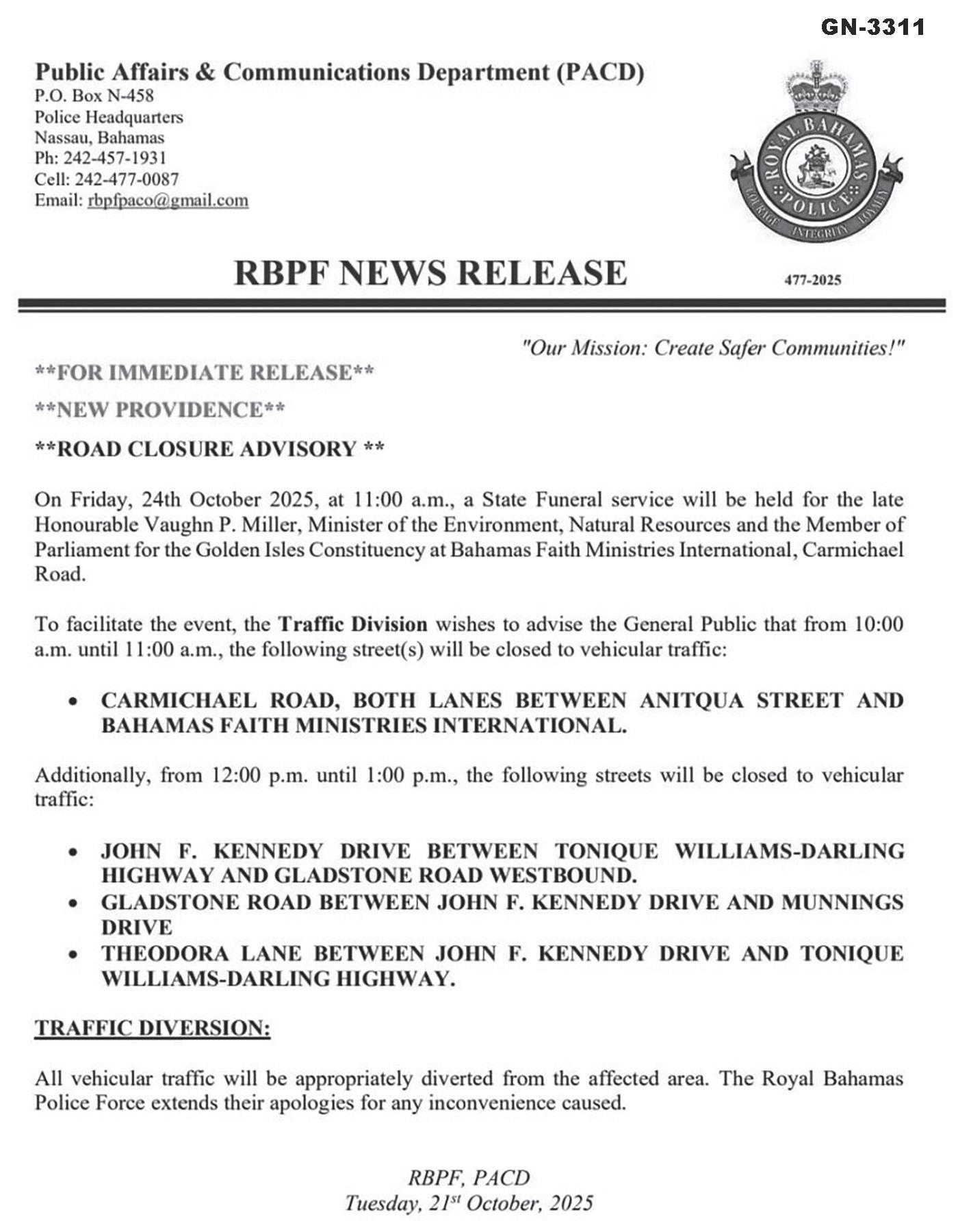
By LYNAIRE MUNNINGS Tribune Staff Reporter lmunnings@tribunemedia.net
SEVERAL bodies of Hurricane Dorian victims are still being stored in trailers in Grand Bahama more than six years after the deadly storm, according to Opposition Leader Michael Pintard, who accused the Davis administration of hypocrisy and neglect over the matter.
Mr Pintard raised the claim in Parliament yesterday as Prime Minister Philip “Brave” Davis officially opened the new Sir Albert Miller Community Centre and Emergency Shelter in Grand Bahama, a facility intended to serve as a refuge during future disasters.
The Free National Movement leader said it was “unconscionable” that the Progressive Liberal Party, after years of criticising the former Minnis administration for delays in burying Dorian victims, now faces the same unresolved issue.
“When I first heard
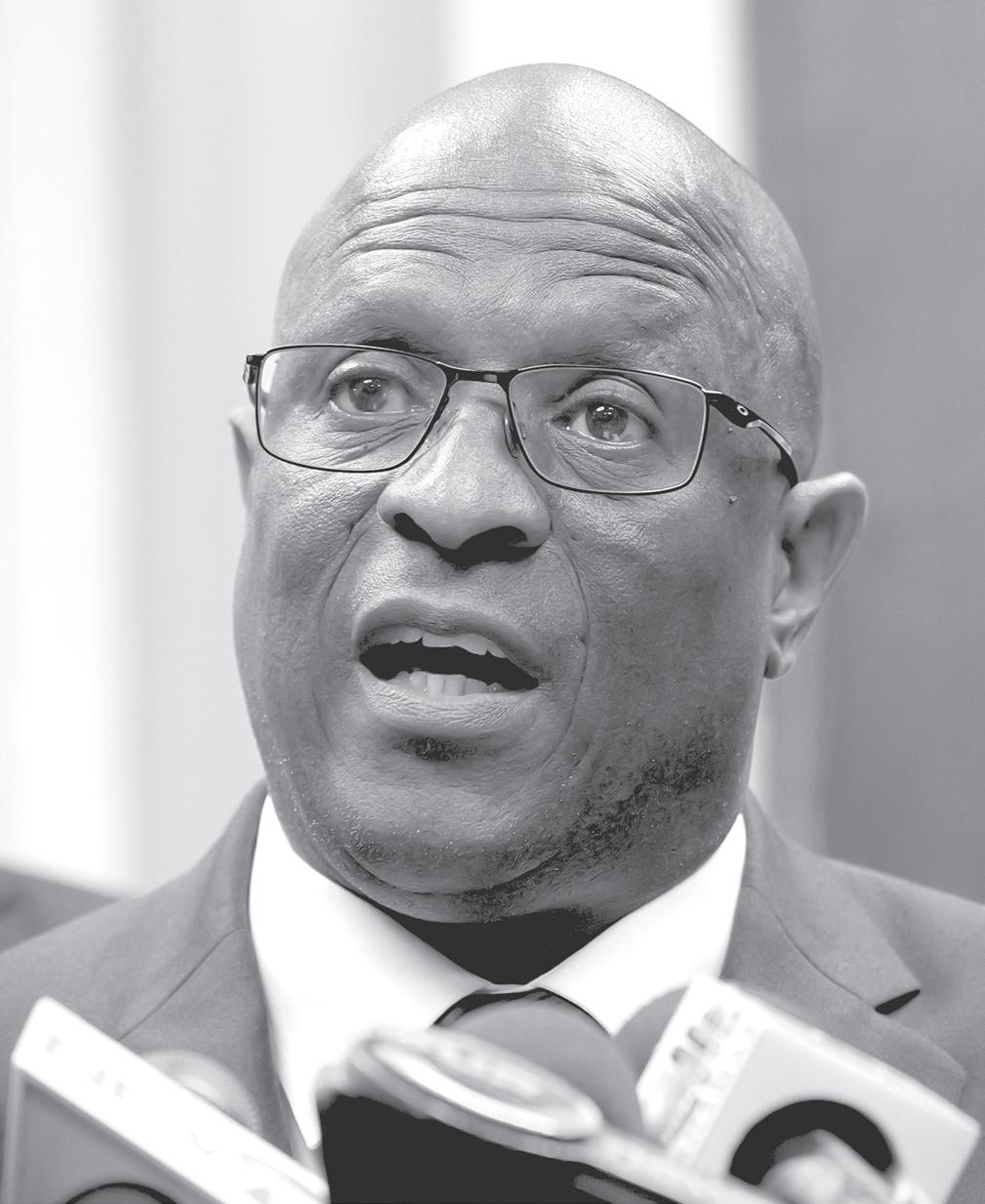
this, I said, this cannot be, it cannot be the case,” Mr Pintard said. “There is a gap between what they say and what they do,” Mr Pintard said. “There’s one rule for
them and there’s another rule for others.”
He also defended his party’s record, arguing that the Minnis administration achieved more progress in housing
repairs and family assistance during its two years after Dorian than the current government has managed in four.
Hurricane Dorian struck The Bahamas on September 1, 2019 as a catastrophic Category 5 storm with winds exceeding 180 miles per hour. It devastated Abaco and Grand Bahama, killing at least 74 people and leaving many missing. Entire communities were flattened, thousands were displaced, and critical infrastructure, including hospitals, schools and government offices, was destroyed.
Hundreds of bodies were recovered and stored in trailers as officials struggled to identify remains—a process that became a source of national grief and political controversy.
When in opposition, the PLP had condemned the Minnis administration’s handling of victims’ remains, promising to ensure proper burials and compassionate treatment for grieving families.
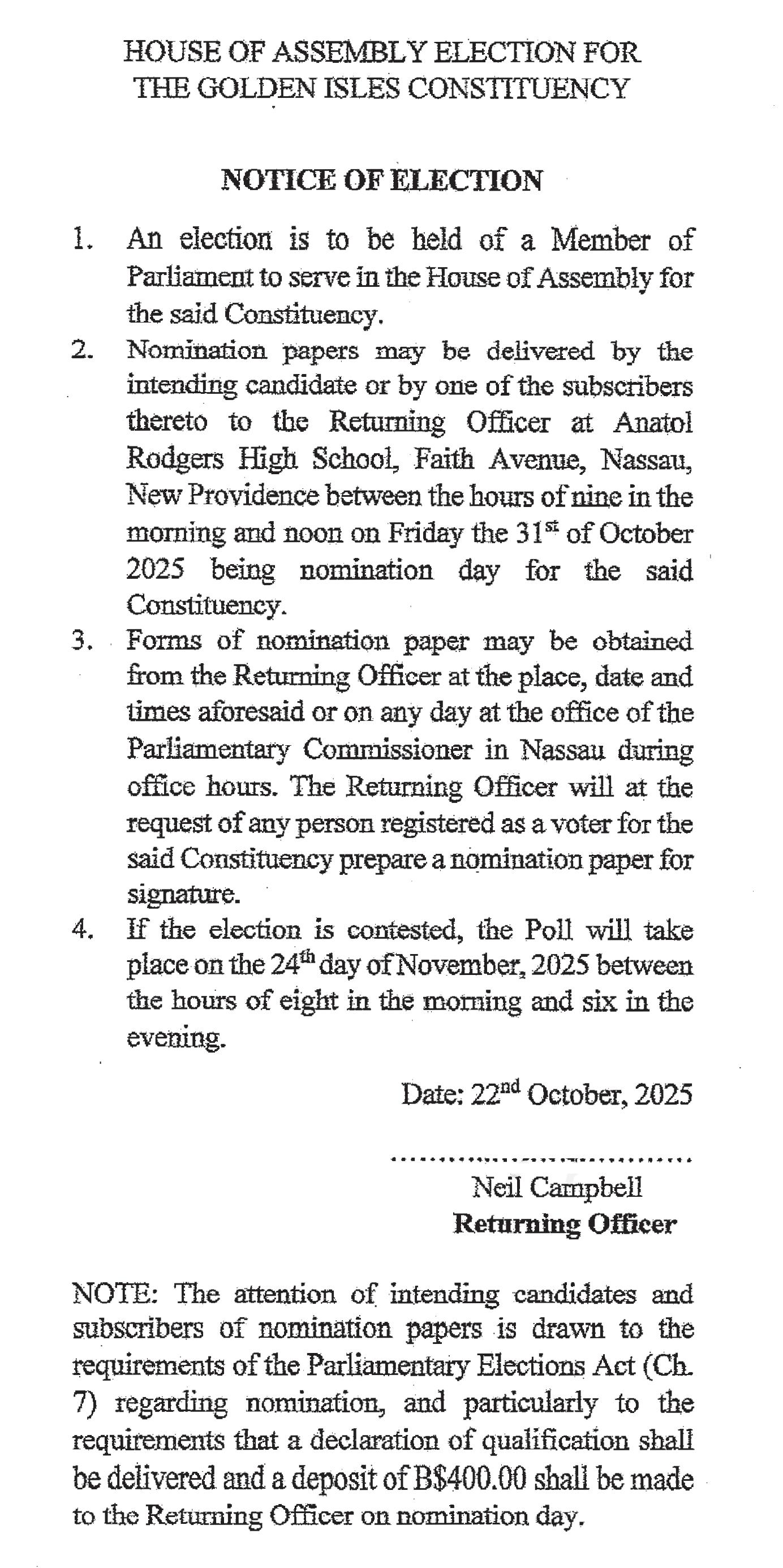
By PAVEL BAILEY Tribune Staff Reporter pbailey@tribunemedia.net
A TEENAGE accused of murder claimed in court that he was attacked in prison by a relative of the man he is accused of killing, leaving him with swelling to his jaw and chin. The 18-year-old, whose name is being withheld because he was a minor at the time of the alleged offence, appeared before Senior Justice Cheryl Grant-Thompson seeking bail after more than four years on remand. He and others are accused of shooting and killing 30-year-old Philip Ferguson in Pinewood Gardens on June 1, 2020. He also faces eight counts of possession of a firearm with intent to endanger life and eight counts of attempted murder.
Defence attorney Myra Russell said her client was placed among adult detainees when he was assaulted in prison. She said the attack was allegedly carried out by Ahmad “Maddie” Clarke, who she claimed was related to the deceased, and that it appeared to have been planned.
Ms Russell said her client received only painkillers and bandages for his injuries and questioned how he could be considered safe if kept in custody.
She added that the defendant’s father reported he is routinely transported with adult inmates between the Magistrate’s and Supreme Courts.
The attorney rejected prosecution claims that the teenager has gang ties, saying the allegation has caused stigma and trauma. She said he is not a danger to the public and noted that he missed the birth of his child while on remand.
Prosecutor Karine McVean said the defendant had been housed in the juvenile section of the Bahamas Department of Correctional Services and did not suffer serious injuries. She said he was placed under tighter security following the incident, which involved a relative of the alleged victim.
Mrs McVean argued that the teenager would be safer in prison, warning that other relatives of the deceased might target him if released.
The defendant told the court he spent only 30 minutes in the juvenile section before a supervisor ordered him moved to the general population. He also said he was chained with adults during transport to court.
The defendant recently turned 18. His Voluntary Bill of Indictment for murder is scheduled for service on November 12, with the bail hearing to continue on November 19.

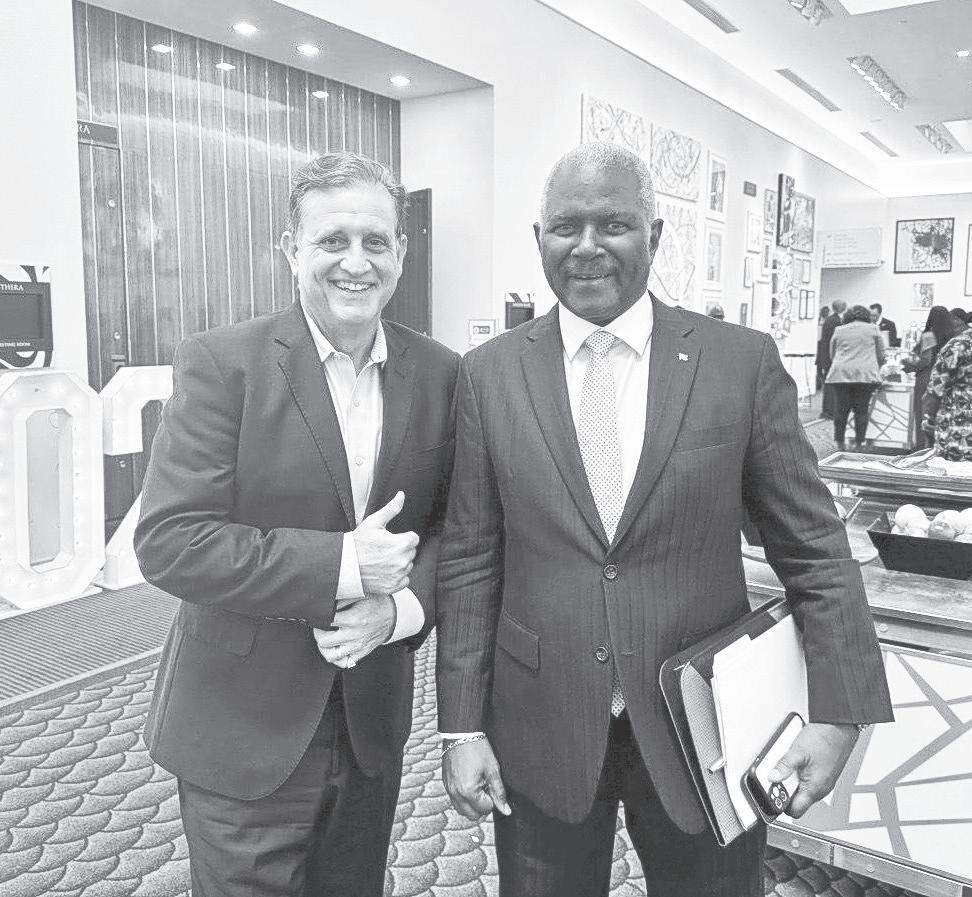

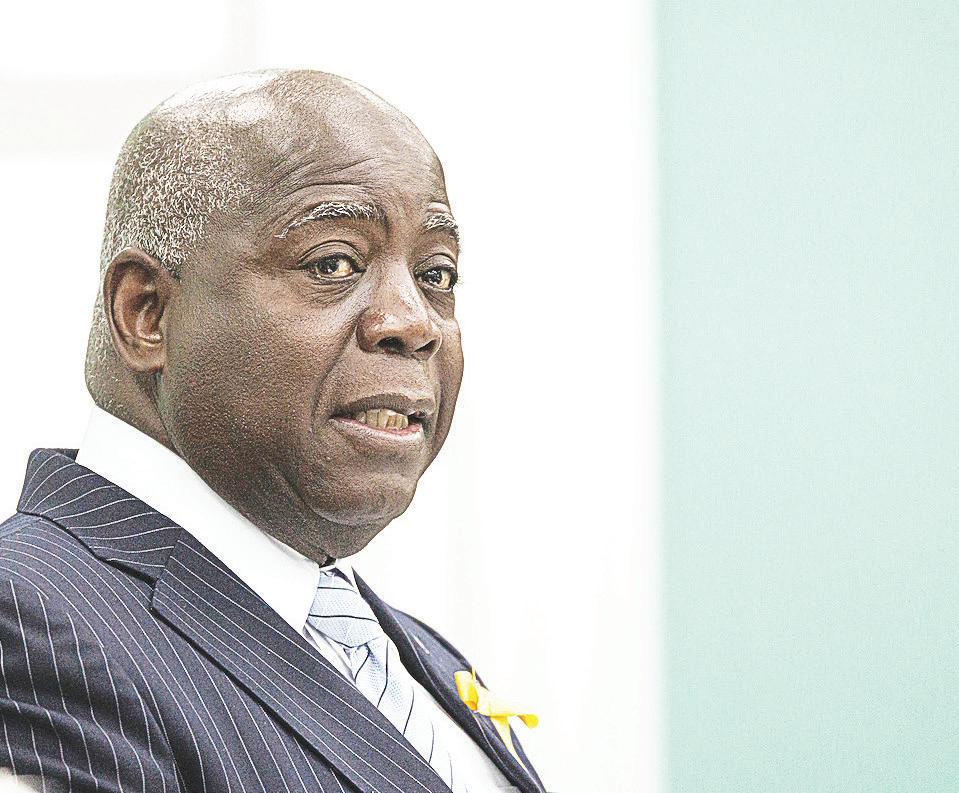

BY LEANDRA ROLLE Tribune Chief Reporter lrolle@tribunemedia.net
THE Davis administration plans to partner with the Rwanda International Institute of Ophthalmology (RIIO) to train Bahamians in that country’s ophthalmology programme, aiming to address the shortage of eye specialists in The Bahamas. Government officials, including Prime Minister Philip Davis and Health and Wellness Minister Dr Michael Darville, expressed interest in the partnership during an exploratory meeting with Rwandan officials yesterday.
The meeting featured a comprehensive presentation by the President of the African Ophthalmology Council on Rwanda’s eye care programme, highlighting the model as a blueprint for international collaboration.
Officials also promoted Rwanda as a progressive nation, noting it’s on track to become the first country where all screening for diabetic eye disease is conducted using artificial intelligence.
The meeting comes as the country’s healthcare system in The Bahamas continues to face an increasing demand for quality eye medical care.
It follows the Bahamas Medical Council’s review of the Rwandan ophthalmology programme for credentialing purposes after a Bahamian doctor had already begun training there and sought confirmation that the programme met the Council’s requirements for specialist certification.
There are two Bahamians enrolled in the programme, and officials are seeking to expand participation.
They hope to formalise the partnership through an MOU, under which the government
would cover tuition and living expenses for Bahamian postgraduate students pursuing specialty training in Rwanda.
Yesterday, Dr Darville noted most Bahamian doctors who receive scholarships or training opportunities in North America prefer to remain abroad after completing their studies.
However, he said officials want to encourage students to return home, adding: “This is the reason why we’re looking at the motherland now so that we can develop a better working relationship.”
In his remarks, Mr Davis stressed that the growing demand for eye care and quality healthcare is a priority for his government.
He added that partnerships such as the one with Rwanda are vital to strengthening the country’s medical system, noting that “we can’t do it alone.”
“We welcome the initiative,” he said. “You have my total support.”
He said when his administration assumed office, many hospital wards were closed, including the eye ward, which he said had been inoperable for at least three years as complaints mounted from people in need of eye care services.
“We went about trying to get beds, renovating those wards, which has now happened, renovating the emergency room, which I expect to be open, Dr Darville, in the next month,” he said.
“It’s been five years and I could say that we have arranged financing for the refurbishment and redevelopment of the eye ward. I don’t know why the funds have not yet been released, but we negotiated that at least three months ago so we expect the work to be done earnestly on that in short order.”


MP for Sea Breeze, Leslia Miller-Brice, has launched ShopSeaBreeze242.com, a new e-commerce platform designed to help entrepreneurs in her constituency reach wider audiences through digital innovation.
The launch took place during the Sea Breeze Business Owners Forum and Website Launch at Christian Life Church, where residents gathered alongside public and private sector experts to receive critical information and resources. The website aims to celebrate local creativity, providing residents with an easy way to find and support businesses in their own community.
“When we choose to shop local, we’re doing more than making a purchase,” said Miller-Brice. “We’re investing in our neighbours, empowering families, and building a stronger Sea Breeze for generations to come.”
The forum also highlighted the national push for digital transformation.
Ms. Tammy Smith introduced DigiLearn Bahamas, a partnership between the government, the University
of The Bahamas, and the Bahamas Technical and Vocational Institute, which offers free technical skills training to 7,250 Bahamians in courses ranging from basic digital literacy to cybersecurity and coding. Further supporting modernization, representatives from the Inland Revenue Department (IRD) and the National Insurance Board (NIB) addressed digital compliance. John Williams of IRD outlined the streamlined, online process for business licensing and introduced the new national liquor licensing registry. Adena Minus of NIB encouraged employers to use the Employer SelfService Portal to manage contributions efficiently. Focusing on growth opportunities, Samantha Rolle, Executive Director of the Small Business Development Centre (SBDC), discussed access to government-secured funding and grants. She noted that Bahamian businesses have seen an almost 30% increase in approved funding from SBDC this year compared to 2021. Since its inception, SBDC has funded 2,483 clients


THE DEPARTMENT of Social Services Children and Family Services Division, Domestic Violence and Counselling Unit, of the Ministry of Social Services, Information and Broadcasting held a one-day workshop on Domestic Violence, on Tuesday at its Social Services offices on Baillou Hill Road. Attended by professionals who work with domestic violence daily, including social workers and police officers, the workshop was held as part of Domestic Violence Month. The workshop’s theme was ‘Safer Homes, Stronger Families.’ Deidre Hepburn (pictured above), acting director of Social Services, told attendees victims of domestic violence must be treated with empathy and not be judged. Persons in attendance heard topics including the role of legal protection and social principles for domestic violence victims.
Photos: Mark Ford/BIS
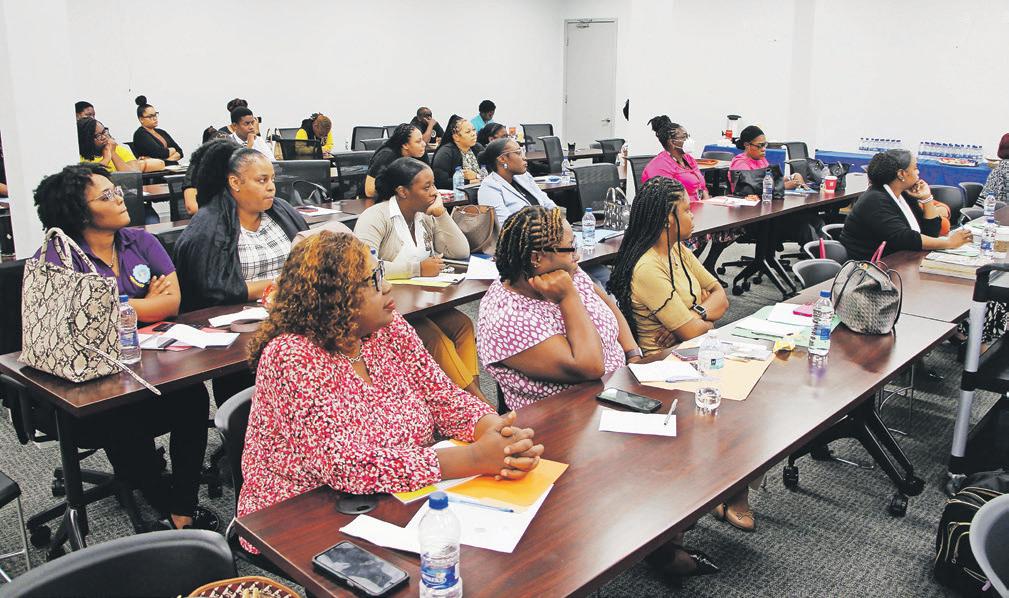
female owners representing nearly 60% of businesses funded this year. The forum concluded
with a lively reception, allowing constituents to network, share concerns, and receive actionable information on growing
their businesses. Business owners are encouraged to sign up for the new site at www.shopseabreeze242. com.









THE Hurricane Hole Medical Center has officially opened its stateof-the-art facility on Paradise Island, aiming to redefine healthcare access for residents, hotel guests, and hospitality staff with a focus on speed and convenience.
Located in the Hurricane Hole Marina, the new center emphasizes a luxury environment where patients, referred to as “Guests of the Harbour,” can access world-class care in a tranquil setting overlooking Nassau Harbour.
“Our mission is simple,” said Lauren Beneby, CEO of Hurricane Hole Medical Center. “We are proud to offer early morning, evening, and weekend hours to accommodate the lifestyle of our community. We make it easy to receive medical attention without losing valuable time.”
The facility is designed for all-in-one convenience, housing urgent care,
primary care, diagnostic imaging, and laboratory testing, all supported by a pharmacy partnership. The center distinguishes itself by guaranteeing fast service with no long waits, reducing stress for patients. It is equipped with advanced diagnostic tools, including CT scans, X-rays, and ultrasounds, ensuring international standards of care.
Services offered include: Urgent Care: Immediate attention with emergency-trained physicians. Primary Care: Comprehensive family and wellness medicine.
Diagnostic Imaging: Precision scanning services.
Laboratory Services: On-site testing with same-day results. The center states it is committed to serving a diverse audience, ensuring everyone feels secure knowing their health is in trusted hands.




